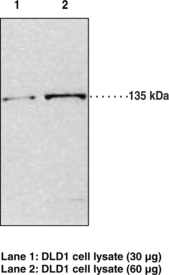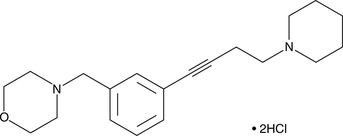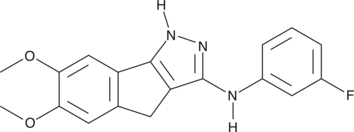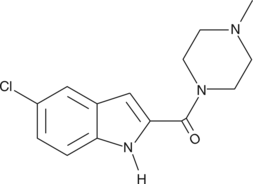Cayman
Showing 25501–25650 of 45550 results
-
The sirtuins (SIRTs) are a family of NAD+-dependent histone deacetylases involved in gene regulation that is relevant to longevity, cancer, gene regulation, energy homeostasis, and apoptosis.{15106,16291} JGB1741 is a small molecule inhibitor of SIRT1 with an IC50 value of 15 μM in a cell-free assay.{18667} It shows relatively weak inhibition for SIRT2 and SIRT3 with IC50 values greater than 100 μM. JGB1741 inhibits metastatic breast cancer MDA-MB 231 cell proliferation with an IC50 value of 512 nM in a cell-based assay and dose-dependently increases p53 acetylation and p53-mediated apoptosis in these cells.
Brand:CaymanSKU:10641 - 10 mgAvailable on backorder
-
The sirtuins (SIRTs) are a family of NAD+-dependent histone deacetylases involved in gene regulation that is relevant to longevity, cancer, gene regulation, energy homeostasis, and apoptosis.{15106,16291} JGB1741 is a small molecule inhibitor of SIRT1 with an IC50 value of 15 μM in a cell-free assay.{18667} It shows relatively weak inhibition for SIRT2 and SIRT3 with IC50 values greater than 100 μM. JGB1741 inhibits metastatic breast cancer MDA-MB 231 cell proliferation with an IC50 value of 512 nM in a cell-based assay and dose-dependently increases p53 acetylation and p53-mediated apoptosis in these cells.
Brand:CaymanSKU:10641 - 25 mgAvailable on backorder
-
The sirtuins (SIRTs) are a family of NAD+-dependent histone deacetylases involved in gene regulation that is relevant to longevity, cancer, gene regulation, energy homeostasis, and apoptosis.{15106,16291} JGB1741 is a small molecule inhibitor of SIRT1 with an IC50 value of 15 μM in a cell-free assay.{18667} It shows relatively weak inhibition for SIRT2 and SIRT3 with IC50 values greater than 100 μM. JGB1741 inhibits metastatic breast cancer MDA-MB 231 cell proliferation with an IC50 value of 512 nM in a cell-based assay and dose-dependently increases p53 acetylation and p53-mediated apoptosis in these cells.
Brand:CaymanSKU:10641 - 5 mgAvailable on backorder
-
JH-II-127 is an orally bioavailable inhibitor of wild-type (WT) and mutant forms of leucine-rich repeat kinase 2 (LRRK2).{47651} It inhibits WT LRRK2, as well as LRRK2 containing the G2019S and A2016T substitution mutations (IC50s = 6.6, 2.2, and 47.7 nM, respectively), which are present in certain patients with Parkinson’s disease, but not LRRK2 containing both mutations (IC50 = 3,080 nM). JH-II-127 (0.1-0.3 µM) inhibits phosphorylation of the serines at positions 910 and 935 of WT LRRK2 and LRRK2G2019S in vitro. It also inhibits Ser935 phosphorylation in vivo in mouse brain, spleen, and kidney when administered at a dose of 30 mg/kg.
Brand:CaymanSKU:22905 - 1 mgAvailable on backorder
-
JH-II-127 is an orally bioavailable inhibitor of wild-type (WT) and mutant forms of leucine-rich repeat kinase 2 (LRRK2).{47651} It inhibits WT LRRK2, as well as LRRK2 containing the G2019S and A2016T substitution mutations (IC50s = 6.6, 2.2, and 47.7 nM, respectively), which are present in certain patients with Parkinson’s disease, but not LRRK2 containing both mutations (IC50 = 3,080 nM). JH-II-127 (0.1-0.3 µM) inhibits phosphorylation of the serines at positions 910 and 935 of WT LRRK2 and LRRK2G2019S in vitro. It also inhibits Ser935 phosphorylation in vivo in mouse brain, spleen, and kidney when administered at a dose of 30 mg/kg.
Brand:CaymanSKU:22905 - 10 mgAvailable on backorder
-
JH-II-127 is an orally bioavailable inhibitor of wild-type (WT) and mutant forms of leucine-rich repeat kinase 2 (LRRK2).{47651} It inhibits WT LRRK2, as well as LRRK2 containing the G2019S and A2016T substitution mutations (IC50s = 6.6, 2.2, and 47.7 nM, respectively), which are present in certain patients with Parkinson’s disease, but not LRRK2 containing both mutations (IC50 = 3,080 nM). JH-II-127 (0.1-0.3 µM) inhibits phosphorylation of the serines at positions 910 and 935 of WT LRRK2 and LRRK2G2019S in vitro. It also inhibits Ser935 phosphorylation in vivo in mouse brain, spleen, and kidney when administered at a dose of 30 mg/kg.
Brand:CaymanSKU:22905 - 25 mgAvailable on backorder
-
JH-II-127 is an orally bioavailable inhibitor of wild-type (WT) and mutant forms of leucine-rich repeat kinase 2 (LRRK2).{47651} It inhibits WT LRRK2, as well as LRRK2 containing the G2019S and A2016T substitution mutations (IC50s = 6.6, 2.2, and 47.7 nM, respectively), which are present in certain patients with Parkinson’s disease, but not LRRK2 containing both mutations (IC50 = 3,080 nM). JH-II-127 (0.1-0.3 µM) inhibits phosphorylation of the serines at positions 910 and 935 of WT LRRK2 and LRRK2G2019S in vitro. It also inhibits Ser935 phosphorylation in vivo in mouse brain, spleen, and kidney when administered at a dose of 30 mg/kg.
Brand:CaymanSKU:22905 - 5 mgAvailable on backorder
-
JIB-04 is a pyridine hydrazone that broadly inhibits Jumonji histone demethylases (IC50s values = 230, 340, 435, 445, 855 and 1,100 nM for JARID1A, JMJD2E, JMJD2B, JMJD2A, JMJD3, and JMJD2C, respectively).{27169} It does not inhibit histone deacetylases and has minimal effect on the iron-containing enzymes methylcytosine dioxygenase TET1 and hypoxia-inducible factor prolyl hydroxylase 2.{27169} JIB-04 inhibits Jumonji demethylase activity, alters gene expression, and blocks viability of cancer cells but not in patient-matched normal cells.{27169,27168} It also inhibits Jumonji demethylase activity in cancer cells in vivo, resulting in reduced tumor burden and prolonged survival.{27169}
Brand:CaymanSKU:- -
JIB-04 is a pyridine hydrazone that broadly inhibits Jumonji histone demethylases (IC50s values = 230, 340, 435, 445, 855 and 1,100 nM for JARID1A, JMJD2E, JMJD2B, JMJD2A, JMJD3, and JMJD2C, respectively).{27169} It does not inhibit histone deacetylases and has minimal effect on the iron-containing enzymes methylcytosine dioxygenase TET1 and hypoxia-inducible factor prolyl hydroxylase 2.{27169} JIB-04 inhibits Jumonji demethylase activity, alters gene expression, and blocks viability of cancer cells but not in patient-matched normal cells.{27169,27168} It also inhibits Jumonji demethylase activity in cancer cells in vivo, resulting in reduced tumor burden and prolonged survival.{27169}
Brand:CaymanSKU:- -
JIB-04 is a pyridine hydrazone that broadly inhibits Jumonji histone demethylases (IC50s values = 230, 340, 435, 445, 855 and 1,100 nM for JARID1A, JMJD2E, JMJD2B, JMJD2A, JMJD3, and JMJD2C, respectively).{27169} It does not inhibit histone deacetylases and has minimal effect on the iron-containing enzymes methylcytosine dioxygenase TET1 and hypoxia-inducible factor prolyl hydroxylase 2.{27169} JIB-04 inhibits Jumonji demethylase activity, alters gene expression, and blocks viability of cancer cells but not in patient-matched normal cells.{27169,27168} It also inhibits Jumonji demethylase activity in cancer cells in vivo, resulting in reduced tumor burden and prolonged survival.{27169}
Brand:CaymanSKU:- -
JIB-04 is a pyridine hydrazone that broadly inhibits Jumonji histone demethylases (IC50s values = 230, 340, 435, 445, 855 and 1,100 nM for JARID1A, JMJD2E, JMJD2B, JMJD2A, JMJD3, and JMJD2C, respectively).{27169} It does not inhibit histone deacetylases and has minimal effect on the iron-containing enzymes methylcytosine dioxygenase TET1 and hypoxia-inducible factor prolyl hydroxylase 2.{27169} JIB-04 inhibits Jumonji demethylase activity, alters gene expression, and blocks viability of cancer cells but not in patient-matched normal cells.{27169,27168} It also inhibits Jumonji demethylase activity in cancer cells in vivo, resulting in reduced tumor burden and prolonged survival.{27169}
Brand:CaymanSKU:- -
JJH260 is an N-hydroxy hydantoin carbamate that inhibits androgen-induced gene 1 (AIG1), an enzyme that hydrolyzes fatty acid esters of hydroxy fatty acids (FAHFAs). It blocks the hydrolysis of 9-PAHSA (Item No. 17037) with an IC50 value of 0.57 µM.{30849} JJH260 also inhibits the novel FAHFA hydrolase androgen-dependent TFPI-regulating protein (ADTRP; IC50 = 8.5 µM), as well as the serine hydrolase ABHD6 and the lysophospholipases LYPLA1 and LYPLA2.{30849} JJH260 inhibits the FAHFA hydrolase activity of LNCaP and T cell lysates and intact cells.{30849}
Brand:CaymanSKU:-Available on backorder
-
JJH260 is an N-hydroxy hydantoin carbamate that inhibits androgen-induced gene 1 (AIG1), an enzyme that hydrolyzes fatty acid esters of hydroxy fatty acids (FAHFAs). It blocks the hydrolysis of 9-PAHSA (Item No. 17037) with an IC50 value of 0.57 µM.{30849} JJH260 also inhibits the novel FAHFA hydrolase androgen-dependent TFPI-regulating protein (ADTRP; IC50 = 8.5 µM), as well as the serine hydrolase ABHD6 and the lysophospholipases LYPLA1 and LYPLA2.{30849} JJH260 inhibits the FAHFA hydrolase activity of LNCaP and T cell lysates and intact cells.{30849}
Brand:CaymanSKU:-Available on backorder
-
JJH260 is an N-hydroxy hydantoin carbamate that inhibits androgen-induced gene 1 (AIG1), an enzyme that hydrolyzes fatty acid esters of hydroxy fatty acids (FAHFAs). It blocks the hydrolysis of 9-PAHSA (Item No. 17037) with an IC50 value of 0.57 µM.{30849} JJH260 also inhibits the novel FAHFA hydrolase androgen-dependent TFPI-regulating protein (ADTRP; IC50 = 8.5 µM), as well as the serine hydrolase ABHD6 and the lysophospholipases LYPLA1 and LYPLA2.{30849} JJH260 inhibits the FAHFA hydrolase activity of LNCaP and T cell lysates and intact cells.{30849}
Brand:CaymanSKU:-Available on backorder
-
JK 184 is an imidazopyridine derivative that inhibits downstream hedgehog signaling, preventing Gli-dependent transcriptional activity (IC50 = 30 nM).{24518} It does so by inhibiting alcohol dehydrogenase 7 (IC50 = 210 nM) and depolymerizing microtubules, preventing their assembly, which is crucial for Gli function.{24518,24517} JK 184 exhibits antiproliferative activity in a range of cancer cell lines (L3.6pl, Panc 05.04, BxPC3, D283 med, Daoy; GI50s = 3-21 nM) and in L3.6pl and BxPC3 pancreatic cancer xenograft models (0.2 mg/mouse/day).{24518}
Brand:CaymanSKU:- -
JK 184 is an imidazopyridine derivative that inhibits downstream hedgehog signaling, preventing Gli-dependent transcriptional activity (IC50 = 30 nM).{24518} It does so by inhibiting alcohol dehydrogenase 7 (IC50 = 210 nM) and depolymerizing microtubules, preventing their assembly, which is crucial for Gli function.{24518,24517} JK 184 exhibits antiproliferative activity in a range of cancer cell lines (L3.6pl, Panc 05.04, BxPC3, D283 med, Daoy; GI50s = 3-21 nM) and in L3.6pl and BxPC3 pancreatic cancer xenograft models (0.2 mg/mouse/day).{24518}
Brand:CaymanSKU:- -
JK 184 is an imidazopyridine derivative that inhibits downstream hedgehog signaling, preventing Gli-dependent transcriptional activity (IC50 = 30 nM).{24518} It does so by inhibiting alcohol dehydrogenase 7 (IC50 = 210 nM) and depolymerizing microtubules, preventing their assembly, which is crucial for Gli function.{24518,24517} JK 184 exhibits antiproliferative activity in a range of cancer cell lines (L3.6pl, Panc 05.04, BxPC3, D283 med, Daoy; GI50s = 3-21 nM) and in L3.6pl and BxPC3 pancreatic cancer xenograft models (0.2 mg/mouse/day).{24518}
Brand:CaymanSKU:- -
JK 184 is an imidazopyridine derivative that inhibits downstream hedgehog signaling, preventing Gli-dependent transcriptional activity (IC50 = 30 nM).{24518} It does so by inhibiting alcohol dehydrogenase 7 (IC50 = 210 nM) and depolymerizing microtubules, preventing their assembly, which is crucial for Gli function.{24518,24517} JK 184 exhibits antiproliferative activity in a range of cancer cell lines (L3.6pl, Panc 05.04, BxPC3, D283 med, Daoy; GI50s = 3-21 nM) and in L3.6pl and BxPC3 pancreatic cancer xenograft models (0.2 mg/mouse/day).{24518}
Brand:CaymanSKU:- -
JKE-1674 is an inhibitor of glutathione peroxidase 4 (GPX4) and an active metabolite of the GPX4 inhibitor ML-210 (Item No. 23282).{55163} JKE-1674 reduces viability of LOX-IMVI cancer cells (EC50 = 0.03 µM) and in a panel of additional cancer cell lines, an effect that can be blocked by the ferroptosis inhibitor ferrostatin-1 (Item No. 17729).
Brand:CaymanSKU:30784 - 1 mgAvailable on backorder
-
JKE-1674 is an inhibitor of glutathione peroxidase 4 (GPX4) and an active metabolite of the GPX4 inhibitor ML-210 (Item No. 23282).{55163} JKE-1674 reduces viability of LOX-IMVI cancer cells (EC50 = 0.03 µM) and in a panel of additional cancer cell lines, an effect that can be blocked by the ferroptosis inhibitor ferrostatin-1 (Item No. 17729).
Brand:CaymanSKU:30784 - 5 mgAvailable on backorder
-
JKE-1716 is an inhibitor of glutathione peroxidase 4 (GPX4) and a derivative of the GPX4 inhibitor ML-210 (Item No. 23282).{55163} JKE-1716 reduces viability of LOX-IMVI cancer cells in a concentration-dependent manner and in a panel of additional cancer cell lines, an effect that can be blocked by the ferroptosis inhibitor ferrostatin-1 (Item No. 17729).
Brand:CaymanSKU:30786 - 1 mgAvailable on backorder
-
JKE-1716 is an inhibitor of glutathione peroxidase 4 (GPX4) and a derivative of the GPX4 inhibitor ML-210 (Item No. 23282).{55163} JKE-1716 reduces viability of LOX-IMVI cancer cells in a concentration-dependent manner and in a panel of additional cancer cell lines, an effect that can be blocked by the ferroptosis inhibitor ferrostatin-1 (Item No. 17729).
Brand:CaymanSKU:30786 - 10 mgAvailable on backorder
-
JKE-1716 is an inhibitor of glutathione peroxidase 4 (GPX4) and a derivative of the GPX4 inhibitor ML-210 (Item No. 23282).{55163} JKE-1716 reduces viability of LOX-IMVI cancer cells in a concentration-dependent manner and in a panel of additional cancer cell lines, an effect that can be blocked by the ferroptosis inhibitor ferrostatin-1 (Item No. 17729).
Brand:CaymanSKU:30786 - 25 mgAvailable on backorder
-
JKE-1716 is an inhibitor of glutathione peroxidase 4 (GPX4) and a derivative of the GPX4 inhibitor ML-210 (Item No. 23282).{55163} JKE-1716 reduces viability of LOX-IMVI cancer cells in a concentration-dependent manner and in a panel of additional cancer cell lines, an effect that can be blocked by the ferroptosis inhibitor ferrostatin-1 (Item No. 17729).
Brand:CaymanSKU:30786 - 5 mgAvailable on backorder
-
Immunogen: Human recombinant JMJD2A amino acids 1-350 • Host: Rabbit • Cross Reactivity: (+) JMJD2C, JMJD2B • Species Reactivity: (+) Human JMJD2A • Application(s): WB • JMJD2A is a lysine specific demethylase with emerging roles in histone modification or epigenetic remodeling.This JMJD2A polyclonal antibody was raised against an N-terminal recombinant fragment of JMJD2A. This fragment (amino acids 1-350) includes the JMJN and JMJC domains but not the two LAP/PHD zinc finger or Tudor domains of the 1,064 amino acid protein.
Brand:CaymanSKU:10382- 500 µl -
Jumonji Domain Containing 2A (JMJD2A) is a lysine specific demethylase with emerging roles in histone modification or epigenetic remodeling.{16409,17969,18035} This JMJD2A polyclonal antibody was raised against an N-terminal recombinant fragment of JMJD2A. This fragment includes amino acids 1-350 including the JMJN and JMJC domains but not the two LAP/PHD zinc finger or Tudor domains of the 1,064 amino acid protein.{16420,18036} JMJD2A is detected at 135 kDa by western blotting using a DLD1 cell lysate as a positive control. Also, the expression of JMJD2A varies by tissue, and northern blotting suggests skeletal muscle as a negative control and lung as a positive control tissue.{18036}
Brand:CaymanSKU:10382 - 500 µlAvailable on backorder
-
Immunogen: Human recombinant JMJD2A amino acids 1-350 • Host: Rabbit • Cross Reactivity: (+) JMJD2C, JMJD2B • Species Reactivity: (+) Human JMJD2A • Application(s): WB • JMJD2A is a lysine specific demethylase with emerging roles in histone modification or epigenetic remodeling.This JMJD2A polyclonal antibody was raised against an N-terminal recombinant fragment of JMJD2A. This fragment (amino acids 1-350) includes the JMJN and JMJC domains but not the two LAP/PHD zinc finger or Tudor domains of the 1,064 amino acid protein.
Brand:CaymanSKU:10382- 500 µlAvailable on backorder
-
Immunogen: human recombinant JMJD2D amino acids 1-354 • Host: Rabbit • Species Reactivity: (+) Human and mouse JMJD2D • Application(s): FC, ICC, IP, and WB • JMJD2D is a lysine specific demethylase with emerging roles in histone modification or epigenetic remodeling.
Brand:CaymanSKU:10383- 1 ea -
Jumonji Domain Containing 2D (JMJD2D) is a lysine specific demethylase with emerging roles in histone modification or epigenetic remodeling.{16420} This JMJD2D polyclonal antibody was raised against a N-terminal recombinant fragment of JMJD2D. JMJD2D is detected at 60 kDa by western blotting using a DLD1 cell lysate as a positive control.
Brand:CaymanSKU:10383 - 1 eaAvailable on backorder
-
Immunogen: human recombinant JMJD2D amino acids 1-354 • Host: Rabbit • Species Reactivity: (+) Human and mouse JMJD2D • Application(s): FC, ICC, IP, and WB • JMJD2D is a lysine specific demethylase with emerging roles in histone modification or epigenetic remodeling.
Brand:CaymanSKU:10383- 1 eaAvailable on backorder
-
Ghrelin is an endogenous ligand for the growth hormone secretagogue receptor that stimulates food intake and transduces signals to hypothalamic regulatory nuclei that control energy homeostasis. JMV3002 is a potent ghrelin receptor antagonist with an IC50 value of 1.1 nM in vitro.{15848} At 80 µg/kg, JMV3002 inhibits hexarelin-stimulated food intake by as much as 98% in rats.{15848} JMV3002 alone does not elicit growth hormone release nor does it inhibit hexarelin-stimulated growth hormone secretion when tested in infant rats at a dose of 160 µg/kg.{15848}
Brand:CaymanSKU:10012699 - 1 mgAvailable on backorder
-
Ghrelin is an endogenous ligand for the growth hormone secretagogue receptor that stimulates food intake and transduces signals to hypothalamic regulatory nuclei that control energy homeostasis. JMV3002 is a potent ghrelin receptor antagonist with an IC50 value of 1.1 nM in vitro.{15848} At 80 µg/kg, JMV3002 inhibits hexarelin-stimulated food intake by as much as 98% in rats.{15848} JMV3002 alone does not elicit growth hormone release nor does it inhibit hexarelin-stimulated growth hormone secretion when tested in infant rats at a dose of 160 µg/kg.{15848}
Brand:CaymanSKU:10012699 - 100 µgAvailable on backorder
-
Ghrelin is an endogenous ligand for the growth hormone secretagogue receptor that stimulates food intake and transduces signals to hypothalamic regulatory nuclei that control energy homeostasis. JMV3002 is a potent ghrelin receptor antagonist with an IC50 value of 1.1 nM in vitro.{15848} At 80 µg/kg, JMV3002 inhibits hexarelin-stimulated food intake by as much as 98% in rats.{15848} JMV3002 alone does not elicit growth hormone release nor does it inhibit hexarelin-stimulated growth hormone secretion when tested in infant rats at a dose of 160 µg/kg.{15848}
Brand:CaymanSKU:10012699 - 5 mgAvailable on backorder
-
Ghrelin is an endogenous ligand for the growth hormone secretagogue receptor that stimulates food intake and transduces signals to hypothalamic regulatory nuclei that control energy homeostasis. JMV3002 is a potent ghrelin receptor antagonist with an IC50 value of 1.1 nM in vitro.{15848} At 80 µg/kg, JMV3002 inhibits hexarelin-stimulated food intake by as much as 98% in rats.{15848} JMV3002 alone does not elicit growth hormone release nor does it inhibit hexarelin-stimulated growth hormone secretion when tested in infant rats at a dose of 160 µg/kg.{15848}
Brand:CaymanSKU:10012699 - 500 µgAvailable on backorder
-
JNJ-0966 is an inhibitor of matrix metalloproteinase-9 (MMP-9) zymogen activation (IC50 = 440 nM).{54517} It is selective for MMP-9 over MMP-1, MMP-2, and MMP-3 zymogen activation at 10 μM and does not inhibit the catalytic activity of MMP-1, -2, -3, -9, or -14. It inhibits invasion of HT-1080 cells in a MatrigelTM assay (IC50 = 1 μM). JNJ-0966 (10 and 30 mg/kg, twice per day) reduces disease severity in a mouse model of experimental autoimmune encephalomyelitis (EAE).
Brand:CaymanSKU:31781 - 1 mgAvailable on backorder
-
JNJ-0966 is an inhibitor of matrix metalloproteinase-9 (MMP-9) zymogen activation (IC50 = 440 nM).{54517} It is selective for MMP-9 over MMP-1, MMP-2, and MMP-3 zymogen activation at 10 μM and does not inhibit the catalytic activity of MMP-1, -2, -3, -9, or -14. It inhibits invasion of HT-1080 cells in a MatrigelTM assay (IC50 = 1 μM). JNJ-0966 (10 and 30 mg/kg, twice per day) reduces disease severity in a mouse model of experimental autoimmune encephalomyelitis (EAE).
Brand:CaymanSKU:31781 - 10 mgAvailable on backorder
-
JNJ-0966 is an inhibitor of matrix metalloproteinase-9 (MMP-9) zymogen activation (IC50 = 440 nM).{54517} It is selective for MMP-9 over MMP-1, MMP-2, and MMP-3 zymogen activation at 10 μM and does not inhibit the catalytic activity of MMP-1, -2, -3, -9, or -14. It inhibits invasion of HT-1080 cells in a MatrigelTM assay (IC50 = 1 μM). JNJ-0966 (10 and 30 mg/kg, twice per day) reduces disease severity in a mouse model of experimental autoimmune encephalomyelitis (EAE).
Brand:CaymanSKU:31781 - 25 mgAvailable on backorder
-
JNJ-0966 is an inhibitor of matrix metalloproteinase-9 (MMP-9) zymogen activation (IC50 = 440 nM).{54517} It is selective for MMP-9 over MMP-1, MMP-2, and MMP-3 zymogen activation at 10 μM and does not inhibit the catalytic activity of MMP-1, -2, -3, -9, or -14. It inhibits invasion of HT-1080 cells in a MatrigelTM assay (IC50 = 1 μM). JNJ-0966 (10 and 30 mg/kg, twice per day) reduces disease severity in a mouse model of experimental autoimmune encephalomyelitis (EAE).
Brand:CaymanSKU:31781 - 5 mgAvailable on backorder
-
JNJ-10181457 is an antagonist of histamine H3 receptors (Kis = 1.17 and 7.08 nM for human and rat receptors, respectively).{49250} It increases extracellular norepinephrine and acetylcholine levels in the frontal cortex of rats when administered subcutaneously at a dose of 10 mg/kg. JNJ-10181457 (1.25-10 mg/kg, p.o.) reduces the number of cataplectic attacks and time spent in cataplexy in familial narcoleptic Dobermans. In mice, JNJ-10181457 (10 mg/kg) decreases the time spent in the open areas of the elevated zero maze, as well as increases locomotor activity in an open field test.{49251} It also inhibits LPS-induced increases in time spent immobile in the tail suspension test in mice.{49252}
Brand:CaymanSKU:11997 - 1 mgAvailable on backorder
-
JNJ-10181457 is an antagonist of histamine H3 receptors (Kis = 1.17 and 7.08 nM for human and rat receptors, respectively).{49250} It increases extracellular norepinephrine and acetylcholine levels in the frontal cortex of rats when administered subcutaneously at a dose of 10 mg/kg. JNJ-10181457 (1.25-10 mg/kg, p.o.) reduces the number of cataplectic attacks and time spent in cataplexy in familial narcoleptic Dobermans. In mice, JNJ-10181457 (10 mg/kg) decreases the time spent in the open areas of the elevated zero maze, as well as increases locomotor activity in an open field test.{49251} It also inhibits LPS-induced increases in time spent immobile in the tail suspension test in mice.{49252}
Brand:CaymanSKU:11997 - 5 mgAvailable on backorder
-
JNJ-10181457 is an antagonist of histamine H3 receptors (Kis = 1.17 and 7.08 nM for human and rat receptors, respectively).{49250} It increases extracellular norepinephrine and acetylcholine levels in the frontal cortex of rats when administered subcutaneously at a dose of 10 mg/kg. JNJ-10181457 (1.25-10 mg/kg, p.o.) reduces the number of cataplectic attacks and time spent in cataplexy in familial narcoleptic Dobermans. In mice, JNJ-10181457 (10 mg/kg) decreases the time spent in the open areas of the elevated zero maze, as well as increases locomotor activity in an open field test.{49251} It also inhibits LPS-induced increases in time spent immobile in the tail suspension test in mice.{49252}
Brand:CaymanSKU:11997 - 500 µgAvailable on backorder
-
Inhibition of the tyrosine kinase activity of growth factor receptors such as the platelet-derived growth factor (PDGF-BB) receptor can have potent antiangiogenic and antiproliferative activity.{14399} JNJ-10198409 is a small molecule inhibitor of platelet-derived growth factor (PDGF-BB) tyrosine kinase with an IC50 value of 4.2 nM when tested in human coronary artery smooth muscle cells.{13764} JNJ-10198409 is a competitive antagonist of the ATP binding and hydrolysis at this receptor, resulting in a dose dependent inhibition of tumor growth and angiogenesis.
Brand:CaymanSKU:10008131 - 1 mgAvailable on backorder
-
Inhibition of the tyrosine kinase activity of growth factor receptors such as the platelet-derived growth factor (PDGF-BB) receptor can have potent antiangiogenic and antiproliferative activity.{14399} JNJ-10198409 is a small molecule inhibitor of platelet-derived growth factor (PDGF-BB) tyrosine kinase with an IC50 value of 4.2 nM when tested in human coronary artery smooth muscle cells.{13764} JNJ-10198409 is a competitive antagonist of the ATP binding and hydrolysis at this receptor, resulting in a dose dependent inhibition of tumor growth and angiogenesis.
Brand:CaymanSKU:10008131 - 10 mgAvailable on backorder
-
Inhibition of the tyrosine kinase activity of growth factor receptors such as the platelet-derived growth factor (PDGF-BB) receptor can have potent antiangiogenic and antiproliferative activity.{14399} JNJ-10198409 is a small molecule inhibitor of platelet-derived growth factor (PDGF-BB) tyrosine kinase with an IC50 value of 4.2 nM when tested in human coronary artery smooth muscle cells.{13764} JNJ-10198409 is a competitive antagonist of the ATP binding and hydrolysis at this receptor, resulting in a dose dependent inhibition of tumor growth and angiogenesis.
Brand:CaymanSKU:10008131 - 5 mgAvailable on backorder
-
Inhibition of the tyrosine kinase activity of growth factor receptors such as the platelet-derived growth factor (PDGF-BB) receptor can have potent antiangiogenic and antiproliferative activity.{14399} JNJ-10198409 is a small molecule inhibitor of platelet-derived growth factor (PDGF-BB) tyrosine kinase with an IC50 value of 4.2 nM when tested in human coronary artery smooth muscle cells.{13764} JNJ-10198409 is a competitive antagonist of the ATP binding and hydrolysis at this receptor, resulting in a dose dependent inhibition of tumor growth and angiogenesis.
Brand:CaymanSKU:10008131 - 50 mgAvailable on backorder
-
JNJ-10397049 is a potent, selective, and bioavailable antagonist of the orexin-2 receptor (OX2R) (KB = 4.5 nM for OX2R versus 1.1 µM for OX1R).{26505,26508,26507} It has no significant affinity for over 50 other neurotransmitters or neuropeptide receptors.{26505} Applied subcutaneously to rats, JNJ-10397049 decreases the latency to persistent sleep and increases persistent sleep time.{26505} This compound produces a widespread attenuation of D-amphetamine-induced relative cerebrovascular signal, with prominent cortical involvement, in rat brains assessed by functional magnetic resonance imaging.{26506}
Brand:CaymanSKU:- -
JNJ-10397049 is a potent, selective, and bioavailable antagonist of the orexin-2 receptor (OX2R) (KB = 4.5 nM for OX2R versus 1.1 µM for OX1R).{26505,26508,26507} It has no significant affinity for over 50 other neurotransmitters or neuropeptide receptors.{26505} Applied subcutaneously to rats, JNJ-10397049 decreases the latency to persistent sleep and increases persistent sleep time.{26505} This compound produces a widespread attenuation of D-amphetamine-induced relative cerebrovascular signal, with prominent cortical involvement, in rat brains assessed by functional magnetic resonance imaging.{26506}
Brand:CaymanSKU:- -
JNJ-10397049 is a potent, selective, and bioavailable antagonist of the orexin-2 receptor (OX2R) (KB = 4.5 nM for OX2R versus 1.1 µM for OX1R).{26505,26508,26507} It has no significant affinity for over 50 other neurotransmitters or neuropeptide receptors.{26505} Applied subcutaneously to rats, JNJ-10397049 decreases the latency to persistent sleep and increases persistent sleep time.{26505} This compound produces a widespread attenuation of D-amphetamine-induced relative cerebrovascular signal, with prominent cortical involvement, in rat brains assessed by functional magnetic resonance imaging.{26506}
Brand:CaymanSKU:- -
Fatty acid amide hydrolase (FAAH) degrades N-acyl ethanolamines, including the endocannabinoid arachidonoyl ethanolamide (AEA). JNJ-1661010 is a selective inhibitor of FAAH (IC50s = 34 and 33 nM in rat and human, respectively) that is able to cross the blood-brain barrier.{22625} At 20 mg/kg, JNJ-1661010 has been shown to elevate levels of AEA in rat brain.{22625} This compound has been used to examine the contribution of endocannabinoid signaling in experimental fibrosis.{22644}
Brand:CaymanSKU:- -
Fatty acid amide hydrolase (FAAH) degrades N-acyl ethanolamines, including the endocannabinoid arachidonoyl ethanolamide (AEA). JNJ-1661010 is a selective inhibitor of FAAH (IC50s = 34 and 33 nM in rat and human, respectively) that is able to cross the blood-brain barrier.{22625} At 20 mg/kg, JNJ-1661010 has been shown to elevate levels of AEA in rat brain.{22625} This compound has been used to examine the contribution of endocannabinoid signaling in experimental fibrosis.{22644}
Brand:CaymanSKU:- -
Fatty acid amide hydrolase (FAAH) degrades N-acyl ethanolamines, including the endocannabinoid arachidonoyl ethanolamide (AEA). JNJ-1661010 is a selective inhibitor of FAAH (IC50s = 34 and 33 nM in rat and human, respectively) that is able to cross the blood-brain barrier.{22625} At 20 mg/kg, JNJ-1661010 has been shown to elevate levels of AEA in rat brain.{22625} This compound has been used to examine the contribution of endocannabinoid signaling in experimental fibrosis.{22644}
Brand:CaymanSKU:- -
Fatty acid amide hydrolase (FAAH) degrades N-acyl ethanolamines, including the endocannabinoid arachidonoyl ethanolamide (AEA). JNJ-1661010 is a selective inhibitor of FAAH (IC50s = 34 and 33 nM in rat and human, respectively) that is able to cross the blood-brain barrier.{22625} At 20 mg/kg, JNJ-1661010 has been shown to elevate levels of AEA in rat brain.{22625} This compound has been used to examine the contribution of endocannabinoid signaling in experimental fibrosis.{22644}
Brand:CaymanSKU:- -
JNJ-17203212 is a transient receptor potential vanilloid 1 (TRPV1) antagonist (Ki = 72 nM for the recombinant guinea pig channel).{56185} It inhibits guinea pig TRPV1 channel activation induced by capsaicin (Item Nos. 92350 | 10010743) or pH decrease (IC50s = 58 and 470 nM, respectively). JNJ-17203212 (20 mg/kg) reduces the number of citric acid- or capsaicin-induced coughs in guinea pigs. It reduces spontaneous and palpitation-induced flinching and guarding in a mouse model of bone cancer pain when administered at a dose of 30 mg/kg.{14469} JNJ-17203212 decreases capsaicin-induced production of calcitonin gene-related peptide (CGRP) in a dose-dependent manner and inflammatory soup-induced trigeminal expression of cfos in rat models of migraine.{56186}
Brand:CaymanSKU:30930 - 10 mgAvailable on backorder
-
JNJ-17203212 is a transient receptor potential vanilloid 1 (TRPV1) antagonist (Ki = 72 nM for the recombinant guinea pig channel).{56185} It inhibits guinea pig TRPV1 channel activation induced by capsaicin (Item Nos. 92350 | 10010743) or pH decrease (IC50s = 58 and 470 nM, respectively). JNJ-17203212 (20 mg/kg) reduces the number of citric acid- or capsaicin-induced coughs in guinea pigs. It reduces spontaneous and palpitation-induced flinching and guarding in a mouse model of bone cancer pain when administered at a dose of 30 mg/kg.{14469} JNJ-17203212 decreases capsaicin-induced production of calcitonin gene-related peptide (CGRP) in a dose-dependent manner and inflammatory soup-induced trigeminal expression of cfos in rat models of migraine.{56186}
Brand:CaymanSKU:30930 - 25 mgAvailable on backorder
-
JNJ-17203212 is a transient receptor potential vanilloid 1 (TRPV1) antagonist (Ki = 72 nM for the recombinant guinea pig channel).{56185} It inhibits guinea pig TRPV1 channel activation induced by capsaicin (Item Nos. 92350 | 10010743) or pH decrease (IC50s = 58 and 470 nM, respectively). JNJ-17203212 (20 mg/kg) reduces the number of citric acid- or capsaicin-induced coughs in guinea pigs. It reduces spontaneous and palpitation-induced flinching and guarding in a mouse model of bone cancer pain when administered at a dose of 30 mg/kg.{14469} JNJ-17203212 decreases capsaicin-induced production of calcitonin gene-related peptide (CGRP) in a dose-dependent manner and inflammatory soup-induced trigeminal expression of cfos in rat models of migraine.{56186}
Brand:CaymanSKU:30930 - 5 mgAvailable on backorder
-
JNJ-17203212 is a transient receptor potential vanilloid 1 (TRPV1) antagonist (Ki = 72 nM for the recombinant guinea pig channel).{56185} It inhibits guinea pig TRPV1 channel activation induced by capsaicin (Item Nos. 92350 | 10010743) or pH decrease (IC50s = 58 and 470 nM, respectively). JNJ-17203212 (20 mg/kg) reduces the number of citric acid- or capsaicin-induced coughs in guinea pigs. It reduces spontaneous and palpitation-induced flinching and guarding in a mouse model of bone cancer pain when administered at a dose of 30 mg/kg.{14469} JNJ-17203212 decreases capsaicin-induced production of calcitonin gene-related peptide (CGRP) in a dose-dependent manner and inflammatory soup-induced trigeminal expression of cfos in rat models of migraine.{56186}
Brand:CaymanSKU:30930 - 50 mgAvailable on backorder
-
JNJ-26481585 is a hydroxamate-based HDAC inhibitor that shows activity toward all HDAC enzymes with highest potency in vitro toward HDAC1 (IC50 = 0.11 nM).{32219} For other HDACs, IC50 values range from 0.33, 0.37, and 0.46 nM for HDACs 2, 11, and 10, respectively, to 32, 77, and 119 nM for HDACs 9, 6, and 7, respectively.{32219} JNJ-26481585 induces apoptosis and cell cycle arrest in multiple myeloma cells and complete tumor growth inhibition in Ras mutant HCT116 colon carcinoma or multiple myeloma xenografts.{32219,32220}
Brand:CaymanSKU:- -
JNJ-26481585 is a hydroxamate-based HDAC inhibitor that shows activity toward all HDAC enzymes with highest potency in vitro toward HDAC1 (IC50 = 0.11 nM).{32219} For other HDACs, IC50 values range from 0.33, 0.37, and 0.46 nM for HDACs 2, 11, and 10, respectively, to 32, 77, and 119 nM for HDACs 9, 6, and 7, respectively.{32219} JNJ-26481585 induces apoptosis and cell cycle arrest in multiple myeloma cells and complete tumor growth inhibition in Ras mutant HCT116 colon carcinoma or multiple myeloma xenografts.{32219,32220}
Brand:CaymanSKU:- -
JNJ-26481585 is a hydroxamate-based HDAC inhibitor that shows activity toward all HDAC enzymes with highest potency in vitro toward HDAC1 (IC50 = 0.11 nM).{32219} For other HDACs, IC50 values range from 0.33, 0.37, and 0.46 nM for HDACs 2, 11, and 10, respectively, to 32, 77, and 119 nM for HDACs 9, 6, and 7, respectively.{32219} JNJ-26481585 induces apoptosis and cell cycle arrest in multiple myeloma cells and complete tumor growth inhibition in Ras mutant HCT116 colon carcinoma or multiple myeloma xenografts.{32219,32220}
Brand:CaymanSKU:- -
JNJ-26481585 is a hydroxamate-based HDAC inhibitor that shows activity toward all HDAC enzymes with highest potency in vitro toward HDAC1 (IC50 = 0.11 nM).{32219} For other HDACs, IC50 values range from 0.33, 0.37, and 0.46 nM for HDACs 2, 11, and 10, respectively, to 32, 77, and 119 nM for HDACs 9, 6, and 7, respectively.{32219} JNJ-26481585 induces apoptosis and cell cycle arrest in multiple myeloma cells and complete tumor growth inhibition in Ras mutant HCT116 colon carcinoma or multiple myeloma xenografts.{32219,32220}
Brand:CaymanSKU:- -
The E3 ubiquitin ligase known as murine double minute 2 (MDM2; HDM2 in humans) binds to and then ubiquitinates several proteins, most notably the tumor suppressor p53.{26610,20554} JNJ-26854165 is an antagonist of MDM2 that suppresses the growth of cancer cell lines expressing wild-type p53 (IC50 values range from 240-440 nM).{27796} It induces p53-mediated transcription culminating in apoptotic death of acute leukemia cells.{27796} JNJ-26854165 is orally bioavailable and has anti-proliferative as well as apoptotic actions in various tumor models.{20554} As MDM2 interacts with and modulates several targets in addition to p53, JNJ-26854165 affects multiple signaling pathways.{20554,27795,27797}
Brand:CaymanSKU:- -
The E3 ubiquitin ligase known as murine double minute 2 (MDM2; HDM2 in humans) binds to and then ubiquitinates several proteins, most notably the tumor suppressor p53.{26610,20554} JNJ-26854165 is an antagonist of MDM2 that suppresses the growth of cancer cell lines expressing wild-type p53 (IC50 values range from 240-440 nM).{27796} It induces p53-mediated transcription culminating in apoptotic death of acute leukemia cells.{27796} JNJ-26854165 is orally bioavailable and has anti-proliferative as well as apoptotic actions in various tumor models.{20554} As MDM2 interacts with and modulates several targets in addition to p53, JNJ-26854165 affects multiple signaling pathways.{20554,27795,27797}
Brand:CaymanSKU:- -
The E3 ubiquitin ligase known as murine double minute 2 (MDM2; HDM2 in humans) binds to and then ubiquitinates several proteins, most notably the tumor suppressor p53.{26610,20554} JNJ-26854165 is an antagonist of MDM2 that suppresses the growth of cancer cell lines expressing wild-type p53 (IC50 values range from 240-440 nM).{27796} It induces p53-mediated transcription culminating in apoptotic death of acute leukemia cells.{27796} JNJ-26854165 is orally bioavailable and has anti-proliferative as well as apoptotic actions in various tumor models.{20554} As MDM2 interacts with and modulates several targets in addition to p53, JNJ-26854165 affects multiple signaling pathways.{20554,27795,27797}
Brand:CaymanSKU:- -
The E3 ubiquitin ligase known as murine double minute 2 (MDM2; HDM2 in humans) binds to and then ubiquitinates several proteins, most notably the tumor suppressor p53.{26610,20554} JNJ-26854165 is an antagonist of MDM2 that suppresses the growth of cancer cell lines expressing wild-type p53 (IC50 values range from 240-440 nM).{27796} It induces p53-mediated transcription culminating in apoptotic death of acute leukemia cells.{27796} JNJ-26854165 is orally bioavailable and has anti-proliferative as well as apoptotic actions in various tumor models.{20554} As MDM2 interacts with and modulates several targets in addition to p53, JNJ-26854165 affects multiple signaling pathways.{20554,27795,27797}
Brand:CaymanSKU:- -
JNJ-31020028 is a brain-permeable selective antagonist of the neuropeptide Y (NPY) receptor Y2 (IC50s = 8.51, 6.03, and 6.17 nM for human, rat, and mouse receptors, respectively) with over 100-fold selectivity for Y2 over Y1, Y4, and Y5 receptors.{38509,38510} JNJ-31020028 inhibits calcium release induced by peptide YY in a functional assay in KAN-TS cells (pKB = 8.04) and blocks NPY(13-36)-induced decreases in twitch contraction amplitude in isolated rat vas deferens (IC50 = 7.94 nM).{38509} Administration of JNJ-31020028 to rats during abstinence (20 mg/kg per day, i.p.) reverses nicotine-induced social anxiety-like behavior and increases hippocampal Y2 receptor mRNA levels.{38511} It reverses withdrawal-induced anxiety-like behavior in rats in the elevated plus maze following a single bolus dose of alcohol when administered at a dose of 15 mg/kg.{38512} In an olfactory bulbectomized rat model of depression, chronic JNJ-31020028 treatment (10 nmol per day, i.c.v.) decreases immobility time in the forced swim test but has no effect in control animals.{38515}
Brand:CaymanSKU:-Available on backorder
-
JNJ-31020028 is a brain-permeable selective antagonist of the neuropeptide Y (NPY) receptor Y2 (IC50s = 8.51, 6.03, and 6.17 nM for human, rat, and mouse receptors, respectively) with over 100-fold selectivity for Y2 over Y1, Y4, and Y5 receptors.{38509,38510} JNJ-31020028 inhibits calcium release induced by peptide YY in a functional assay in KAN-TS cells (pKB = 8.04) and blocks NPY(13-36)-induced decreases in twitch contraction amplitude in isolated rat vas deferens (IC50 = 7.94 nM).{38509} Administration of JNJ-31020028 to rats during abstinence (20 mg/kg per day, i.p.) reverses nicotine-induced social anxiety-like behavior and increases hippocampal Y2 receptor mRNA levels.{38511} It reverses withdrawal-induced anxiety-like behavior in rats in the elevated plus maze following a single bolus dose of alcohol when administered at a dose of 15 mg/kg.{38512} In an olfactory bulbectomized rat model of depression, chronic JNJ-31020028 treatment (10 nmol per day, i.c.v.) decreases immobility time in the forced swim test but has no effect in control animals.{38515}
Brand:CaymanSKU:-Available on backorder
-
JNJ-31020028 is a brain-permeable selective antagonist of the neuropeptide Y (NPY) receptor Y2 (IC50s = 8.51, 6.03, and 6.17 nM for human, rat, and mouse receptors, respectively) with over 100-fold selectivity for Y2 over Y1, Y4, and Y5 receptors.{38509,38510} JNJ-31020028 inhibits calcium release induced by peptide YY in a functional assay in KAN-TS cells (pKB = 8.04) and blocks NPY(13-36)-induced decreases in twitch contraction amplitude in isolated rat vas deferens (IC50 = 7.94 nM).{38509} Administration of JNJ-31020028 to rats during abstinence (20 mg/kg per day, i.p.) reverses nicotine-induced social anxiety-like behavior and increases hippocampal Y2 receptor mRNA levels.{38511} It reverses withdrawal-induced anxiety-like behavior in rats in the elevated plus maze following a single bolus dose of alcohol when administered at a dose of 15 mg/kg.{38512} In an olfactory bulbectomized rat model of depression, chronic JNJ-31020028 treatment (10 nmol per day, i.c.v.) decreases immobility time in the forced swim test but has no effect in control animals.{38515}
Brand:CaymanSKU:-Available on backorder
-
JNJ-31020028 is a brain-permeable selective antagonist of the neuropeptide Y (NPY) receptor Y2 (IC50s = 8.51, 6.03, and 6.17 nM for human, rat, and mouse receptors, respectively) with over 100-fold selectivity for Y2 over Y1, Y4, and Y5 receptors.{38509,38510} JNJ-31020028 inhibits calcium release induced by peptide YY in a functional assay in KAN-TS cells (pKB = 8.04) and blocks NPY(13-36)-induced decreases in twitch contraction amplitude in isolated rat vas deferens (IC50 = 7.94 nM).{38509} Administration of JNJ-31020028 to rats during abstinence (20 mg/kg per day, i.p.) reverses nicotine-induced social anxiety-like behavior and increases hippocampal Y2 receptor mRNA levels.{38511} It reverses withdrawal-induced anxiety-like behavior in rats in the elevated plus maze following a single bolus dose of alcohol when administered at a dose of 15 mg/kg.{38512} In an olfactory bulbectomized rat model of depression, chronic JNJ-31020028 treatment (10 nmol per day, i.c.v.) decreases immobility time in the forced swim test but has no effect in control animals.{38515}
Brand:CaymanSKU:-Available on backorder
-
JNJ-38877605 is an ATP-competitive inhibitor of Met kinase (IC50 = 4 nM).{46502} It is at least 600-fold selective for Met in a panel of approximately 250 tyrosine and serine-threonine kinases. JNJ-38877605 inhibits the growth of cancer cell lines with MET gene amplification (IC50s = 11-50 nM) but has no effect on the growth of control cells with normal MET gene copy number or no MET expression.{46503} The efficacy of JNJ-38877605 against MET-amplified cells decreases in the presence of increasing concentrations of recombinant human hepatocyte growth factor (HGF). JNJ-38877605 (50 mg/kg) sensitizes tumors to radiotherapy in U251 glioma and MDA-MB-231 breast cancer mouse xenograft models and increases apoptosis in irradiated tumors in the MDA-MB-231 mouse xenograft model.{46504} It reduces tumor size by 6-fold and the number of blood vessels in tumors by 80% in an RU-P melanoma mouse xenograft model when administered at a dose of 20 mg/kg.{46505}
Brand:CaymanSKU:27650 - 10 mgAvailable on backorder
-
JNJ-38877605 is an ATP-competitive inhibitor of Met kinase (IC50 = 4 nM).{46502} It is at least 600-fold selective for Met in a panel of approximately 250 tyrosine and serine-threonine kinases. JNJ-38877605 inhibits the growth of cancer cell lines with MET gene amplification (IC50s = 11-50 nM) but has no effect on the growth of control cells with normal MET gene copy number or no MET expression.{46503} The efficacy of JNJ-38877605 against MET-amplified cells decreases in the presence of increasing concentrations of recombinant human hepatocyte growth factor (HGF). JNJ-38877605 (50 mg/kg) sensitizes tumors to radiotherapy in U251 glioma and MDA-MB-231 breast cancer mouse xenograft models and increases apoptosis in irradiated tumors in the MDA-MB-231 mouse xenograft model.{46504} It reduces tumor size by 6-fold and the number of blood vessels in tumors by 80% in an RU-P melanoma mouse xenograft model when administered at a dose of 20 mg/kg.{46505}
Brand:CaymanSKU:27650 - 100 mgAvailable on backorder
-
JNJ-38877605 is an ATP-competitive inhibitor of Met kinase (IC50 = 4 nM).{46502} It is at least 600-fold selective for Met in a panel of approximately 250 tyrosine and serine-threonine kinases. JNJ-38877605 inhibits the growth of cancer cell lines with MET gene amplification (IC50s = 11-50 nM) but has no effect on the growth of control cells with normal MET gene copy number or no MET expression.{46503} The efficacy of JNJ-38877605 against MET-amplified cells decreases in the presence of increasing concentrations of recombinant human hepatocyte growth factor (HGF). JNJ-38877605 (50 mg/kg) sensitizes tumors to radiotherapy in U251 glioma and MDA-MB-231 breast cancer mouse xenograft models and increases apoptosis in irradiated tumors in the MDA-MB-231 mouse xenograft model.{46504} It reduces tumor size by 6-fold and the number of blood vessels in tumors by 80% in an RU-P melanoma mouse xenograft model when administered at a dose of 20 mg/kg.{46505}
Brand:CaymanSKU:27650 - 5 mgAvailable on backorder
-
JNJ-38877605 is an ATP-competitive inhibitor of Met kinase (IC50 = 4 nM).{46502} It is at least 600-fold selective for Met in a panel of approximately 250 tyrosine and serine-threonine kinases. JNJ-38877605 inhibits the growth of cancer cell lines with MET gene amplification (IC50s = 11-50 nM) but has no effect on the growth of control cells with normal MET gene copy number or no MET expression.{46503} The efficacy of JNJ-38877605 against MET-amplified cells decreases in the presence of increasing concentrations of recombinant human hepatocyte growth factor (HGF). JNJ-38877605 (50 mg/kg) sensitizes tumors to radiotherapy in U251 glioma and MDA-MB-231 breast cancer mouse xenograft models and increases apoptosis in irradiated tumors in the MDA-MB-231 mouse xenograft model.{46504} It reduces tumor size by 6-fold and the number of blood vessels in tumors by 80% in an RU-P melanoma mouse xenograft model when administered at a dose of 20 mg/kg.{46505}
Brand:CaymanSKU:27650 - 50 mgAvailable on backorder
-
JNJ-40418677 is a modulator of γ-secretase.{46387} It reduces the levels of amyloid-β (1-42) (Aβ42; Item No. 20574) in a cell-free γ-secretase modulation assay. It also reduces the secretion of Aβ42, but not total Aβ, in SK-N-BE(2) human neuroblastoma cells expressing amyloid precursor protein (APP; mean IC50 = 200 nM) and in primary rat cortical neurons (mean IC50 = 185 nM). JNJ-40418677 (100 and 300 mg/kg) reduces the level of Aβ42 in wild-type mouse brain. It decreases brain levels of Aβ42, Aβ40, and Aβ38 in the deposited fraction, and Aβ42 and Aβ40 in the soluble fraction, in the Tg2576 mouse model of Alzheimer’s disease when administered at doses of 60 and 120 mg/kg per day in the diet for seven months. It also reduces increases in the number of amyloid plaques in Tg2576 mouse brain compared to vehicle control animals.
Brand:CaymanSKU:21869 -Out of stock
-
JNJ-40418677 is a modulator of γ-secretase.{46387} It reduces the levels of amyloid-β (1-42) (Aβ42; Item No. 20574) in a cell-free γ-secretase modulation assay. It also reduces the secretion of Aβ42, but not total Aβ, in SK-N-BE(2) human neuroblastoma cells expressing amyloid precursor protein (APP; mean IC50 = 200 nM) and in primary rat cortical neurons (mean IC50 = 185 nM). JNJ-40418677 (100 and 300 mg/kg) reduces the level of Aβ42 in wild-type mouse brain. It decreases brain levels of Aβ42, Aβ40, and Aβ38 in the deposited fraction, and Aβ42 and Aβ40 in the soluble fraction, in the Tg2576 mouse model of Alzheimer’s disease when administered at doses of 60 and 120 mg/kg per day in the diet for seven months. It also reduces increases in the number of amyloid plaques in Tg2576 mouse brain compared to vehicle control animals.
Brand:CaymanSKU:21869 -Out of stock
-
JNJ-40418677 is a modulator of γ-secretase.{46387} It reduces the levels of amyloid-β (1-42) (Aβ42; Item No. 20574) in a cell-free γ-secretase modulation assay. It also reduces the secretion of Aβ42, but not total Aβ, in SK-N-BE(2) human neuroblastoma cells expressing amyloid precursor protein (APP; mean IC50 = 200 nM) and in primary rat cortical neurons (mean IC50 = 185 nM). JNJ-40418677 (100 and 300 mg/kg) reduces the level of Aβ42 in wild-type mouse brain. It decreases brain levels of Aβ42, Aβ40, and Aβ38 in the deposited fraction, and Aβ42 and Aβ40 in the soluble fraction, in the Tg2576 mouse model of Alzheimer’s disease when administered at doses of 60 and 120 mg/kg per day in the diet for seven months. It also reduces increases in the number of amyloid plaques in Tg2576 mouse brain compared to vehicle control animals.
Brand:CaymanSKU:21869 -Out of stock
-
JNJ-40418677 is a modulator of γ-secretase.{46387} It reduces the levels of amyloid-β (1-42) (Aβ42; Item No. 20574) in a cell-free γ-secretase modulation assay. It also reduces the secretion of Aβ42, but not total Aβ, in SK-N-BE(2) human neuroblastoma cells expressing amyloid precursor protein (APP; mean IC50 = 200 nM) and in primary rat cortical neurons (mean IC50 = 185 nM). JNJ-40418677 (100 and 300 mg/kg) reduces the level of Aβ42 in wild-type mouse brain. It decreases brain levels of Aβ42, Aβ40, and Aβ38 in the deposited fraction, and Aβ42 and Aβ40 in the soluble fraction, in the Tg2576 mouse model of Alzheimer’s disease when administered at doses of 60 and 120 mg/kg per day in the diet for seven months. It also reduces increases in the number of amyloid plaques in Tg2576 mouse brain compared to vehicle control animals.
Brand:CaymanSKU:21869 -Out of stock
-
Hypoxia-inducible factor (HIF) prolyl hydroxylase (PHD) enzymes act as central gatekeepers of posttranscriptional and transcriptional adaptation to hypoxia, oxidative stress, and excitotoxicity. Their catalytic activity is dependent on iron, 2-oxoglutarate (2-OG), and oxygen, and leads to the stabilization of a host of proteins, including the hypoxia-inducible transcription factors in response to oxygen availability.{29642} Inhibitors of PHD have been used to mimic a hypoxic response in order to study a range of oxygen-deprivation-related disorders, including anemia, ulcerative colitis, myocardial ischemia, stroke, and metabolic disorders. JNJ-42041935 is a selective, 2-OG competitive, and reversible inhibitor of PHD enzymes (pKis = 7.91, 7.29, and 7.65 for PHD1, 2, and 3, respectively).{29641} It is >100-fold selective for PHD compared to the related FIH (factor-inhibiting HIF) and a panel of various other enzymes.{29641} In an inflammation-induced anemia model in rats, 100 µM/kg/day JNJ-42041935 significantly increased the number of circulating reticulocytes and red blood cells, increased blood hemoglobin and hematocrit, and restored mean corpuscular volume and mean cell hemoglobin of red bloods cells.{29641}
Brand:CaymanSKU:- -
Hypoxia-inducible factor (HIF) prolyl hydroxylase (PHD) enzymes act as central gatekeepers of posttranscriptional and transcriptional adaptation to hypoxia, oxidative stress, and excitotoxicity. Their catalytic activity is dependent on iron, 2-oxoglutarate (2-OG), and oxygen, and leads to the stabilization of a host of proteins, including the hypoxia-inducible transcription factors in response to oxygen availability.{29642} Inhibitors of PHD have been used to mimic a hypoxic response in order to study a range of oxygen-deprivation-related disorders, including anemia, ulcerative colitis, myocardial ischemia, stroke, and metabolic disorders. JNJ-42041935 is a selective, 2-OG competitive, and reversible inhibitor of PHD enzymes (pKis = 7.91, 7.29, and 7.65 for PHD1, 2, and 3, respectively).{29641} It is >100-fold selective for PHD compared to the related FIH (factor-inhibiting HIF) and a panel of various other enzymes.{29641} In an inflammation-induced anemia model in rats, 100 µM/kg/day JNJ-42041935 significantly increased the number of circulating reticulocytes and red blood cells, increased blood hemoglobin and hematocrit, and restored mean corpuscular volume and mean cell hemoglobin of red bloods cells.{29641}
Brand:CaymanSKU:- -
Hypoxia-inducible factor (HIF) prolyl hydroxylase (PHD) enzymes act as central gatekeepers of posttranscriptional and transcriptional adaptation to hypoxia, oxidative stress, and excitotoxicity. Their catalytic activity is dependent on iron, 2-oxoglutarate (2-OG), and oxygen, and leads to the stabilization of a host of proteins, including the hypoxia-inducible transcription factors in response to oxygen availability.{29642} Inhibitors of PHD have been used to mimic a hypoxic response in order to study a range of oxygen-deprivation-related disorders, including anemia, ulcerative colitis, myocardial ischemia, stroke, and metabolic disorders. JNJ-42041935 is a selective, 2-OG competitive, and reversible inhibitor of PHD enzymes (pKis = 7.91, 7.29, and 7.65 for PHD1, 2, and 3, respectively).{29641} It is >100-fold selective for PHD compared to the related FIH (factor-inhibiting HIF) and a panel of various other enzymes.{29641} In an inflammation-induced anemia model in rats, 100 µM/kg/day JNJ-42041935 significantly increased the number of circulating reticulocytes and red blood cells, increased blood hemoglobin and hematocrit, and restored mean corpuscular volume and mean cell hemoglobin of red bloods cells.{29641}
Brand:CaymanSKU:- -
JNJ-42153605 is a positive allosteric modulator of metabotropic glutamate receptor 2 (mGluR2; EC50 = 17 nM in CHO cells expressing the human receptor).{48351} In vivo, JNJ-42153605 (3 mg/kg) inhibits mGluR2-mediated rapid eye movement (REM) sleep in rats. It also reverses phencyclidine-induced hyperlocomotion in mice (ED50 = 5.4 mg/kg).
Brand:CaymanSKU:21984 -Out of stock
-
JNJ-42153605 is a positive allosteric modulator of metabotropic glutamate receptor 2 (mGluR2; EC50 = 17 nM in CHO cells expressing the human receptor).{48351} In vivo, JNJ-42153605 (3 mg/kg) inhibits mGluR2-mediated rapid eye movement (REM) sleep in rats. It also reverses phencyclidine-induced hyperlocomotion in mice (ED50 = 5.4 mg/kg).
Brand:CaymanSKU:21984 -Out of stock
-
JNJ-42153605 is a positive allosteric modulator of metabotropic glutamate receptor 2 (mGluR2; EC50 = 17 nM in CHO cells expressing the human receptor).{48351} In vivo, JNJ-42153605 (3 mg/kg) inhibits mGluR2-mediated rapid eye movement (REM) sleep in rats. It also reverses phencyclidine-induced hyperlocomotion in mice (ED50 = 5.4 mg/kg).
Brand:CaymanSKU:21984 -Out of stock
-
JNJ-42153605 is a positive allosteric modulator of metabotropic glutamate receptor 2 (mGluR2; EC50 = 17 nM in CHO cells expressing the human receptor).{48351} In vivo, JNJ-42153605 (3 mg/kg) inhibits mGluR2-mediated rapid eye movement (REM) sleep in rats. It also reverses phencyclidine-induced hyperlocomotion in mice (ED50 = 5.4 mg/kg).
Brand:CaymanSKU:21984 -Out of stock
-
JNJ-42165279 is a potent, irreversible inhibitor of fatty acid amide hydrolase (FAAH; IC50s = 70 and 313 nM for human and rat forms, respectively).{32207} It displays selectivity for FAAH over a panel of other enzymes, receptors, transporters, and ion channels. JNJ-42165279 is active in vivo, blocking FAAH activity in brain and periphery of rats and raising concentrations of anandamide (Item No. 90050), oleoyl ethanolamide (Item No. 90265), and palmitoyl ethanolamide (Item No. 90350).{32207} It is also efficacious in the spinal nerve ligation model of neuropathic pain.{32207}
Brand:CaymanSKU:19987 -Available on backorder
-
JNJ-42165279 is a potent, irreversible inhibitor of fatty acid amide hydrolase (FAAH; IC50s = 70 and 313 nM for human and rat forms, respectively).{32207} It displays selectivity for FAAH over a panel of other enzymes, receptors, transporters, and ion channels. JNJ-42165279 is active in vivo, blocking FAAH activity in brain and periphery of rats and raising concentrations of anandamide (Item No. 90050), oleoyl ethanolamide (Item No. 90265), and palmitoyl ethanolamide (Item No. 90350).{32207} It is also efficacious in the spinal nerve ligation model of neuropathic pain.{32207}
Brand:CaymanSKU:19987 -Available on backorder
-
JNJ-42165279 is a potent, irreversible inhibitor of fatty acid amide hydrolase (FAAH; IC50s = 70 and 313 nM for human and rat forms, respectively).{32207} It displays selectivity for FAAH over a panel of other enzymes, receptors, transporters, and ion channels. JNJ-42165279 is active in vivo, blocking FAAH activity in brain and periphery of rats and raising concentrations of anandamide (Item No. 90050), oleoyl ethanolamide (Item No. 90265), and palmitoyl ethanolamide (Item No. 90350).{32207} It is also efficacious in the spinal nerve ligation model of neuropathic pain.{32207}
Brand:CaymanSKU:19987 -Available on backorder
-
JNJ-42165279 is a potent, irreversible inhibitor of fatty acid amide hydrolase (FAAH; IC50s = 70 and 313 nM for human and rat forms, respectively).{32207} It displays selectivity for FAAH over a panel of other enzymes, receptors, transporters, and ion channels. JNJ-42165279 is active in vivo, blocking FAAH activity in brain and periphery of rats and raising concentrations of anandamide (Item No. 90050), oleoyl ethanolamide (Item No. 90265), and palmitoyl ethanolamide (Item No. 90350).{32207} It is also efficacious in the spinal nerve ligation model of neuropathic pain.{32207}
Brand:CaymanSKU:19987 -Available on backorder
-
JNJ-42756493 is an orally bioavailable inhibitor of fibroblast growth factor receptor (FGFR) with IC50 values of 1.2, 2.5, 3, and 5.7 nM for FGFR1-4, respectively, using isolated recombinant FGFR kinases.{34449} It is selective for FGFR over the VEGF receptor 2 (IC50 = 36.8 nM). It inhibits proliferation in Ba/F3 cells expressing FGFR subtypes with IC50 values of 22.1, 13.2, and 25 nM for FGFR1, 3, and 4, respectively. It inhibits FGFR activity in non-tumor and tumor cell lines, as well as in xenograft models.{34449} Formulations containing JNJ-42756493 are in Phase II clinical trials for patients with various cancers.
Brand:CaymanSKU:21813 -Out of stock
-
JNJ-42756493 is an orally bioavailable inhibitor of fibroblast growth factor receptor (FGFR) with IC50 values of 1.2, 2.5, 3, and 5.7 nM for FGFR1-4, respectively, using isolated recombinant FGFR kinases.{34449} It is selective for FGFR over the VEGF receptor 2 (IC50 = 36.8 nM). It inhibits proliferation in Ba/F3 cells expressing FGFR subtypes with IC50 values of 22.1, 13.2, and 25 nM for FGFR1, 3, and 4, respectively. It inhibits FGFR activity in non-tumor and tumor cell lines, as well as in xenograft models.{34449} Formulations containing JNJ-42756493 are in Phase II clinical trials for patients with various cancers.
Brand:CaymanSKU:21813 -Out of stock
-
JNJ-42756493 is an orally bioavailable inhibitor of fibroblast growth factor receptor (FGFR) with IC50 values of 1.2, 2.5, 3, and 5.7 nM for FGFR1-4, respectively, using isolated recombinant FGFR kinases.{34449} It is selective for FGFR over the VEGF receptor 2 (IC50 = 36.8 nM). It inhibits proliferation in Ba/F3 cells expressing FGFR subtypes with IC50 values of 22.1, 13.2, and 25 nM for FGFR1, 3, and 4, respectively. It inhibits FGFR activity in non-tumor and tumor cell lines, as well as in xenograft models.{34449} Formulations containing JNJ-42756493 are in Phase II clinical trials for patients with various cancers.
Brand:CaymanSKU:21813 -Out of stock
-
JNJ-42756493 is an orally bioavailable inhibitor of fibroblast growth factor receptor (FGFR) with IC50 values of 1.2, 2.5, 3, and 5.7 nM for FGFR1-4, respectively, using isolated recombinant FGFR kinases.{34449} It is selective for FGFR over the VEGF receptor 2 (IC50 = 36.8 nM). It inhibits proliferation in Ba/F3 cells expressing FGFR subtypes with IC50 values of 22.1, 13.2, and 25 nM for FGFR1, 3, and 4, respectively. It inhibits FGFR activity in non-tumor and tumor cell lines, as well as in xenograft models.{34449} Formulations containing JNJ-42756493 are in Phase II clinical trials for patients with various cancers.
Brand:CaymanSKU:21813 -Out of stock
-
JNJ-47965567 is a selective antagonist of the purinergic receptor P2X subtype 7 (P2X7), a ligand-gated ion channel. Activation of P2X receptors by BzATP (Item No. 15577) induces calcium flux, which is reduced by JNJ-47965567 in 1321N1 cells transfected with recombinant P2X7 human, macaque, dog, rat, or mouse protein with pIC50s of 8.3, 8.6, 8.5, 7.2, or 7.5, respectively.{34131} JNJ-47965567 suppresses neonatal hypoxia-induced seizures in mice and has some anticonvulsant properties in rats.{34134,34132} It also reduces spontaneous seizures in epileptic mice even after treatment is stopped.{34133}
Brand:CaymanSKU:21895 -Out of stock
-
JNJ-47965567 is a selective antagonist of the purinergic receptor P2X subtype 7 (P2X7), a ligand-gated ion channel. Activation of P2X receptors by BzATP (Item No. 15577) induces calcium flux, which is reduced by JNJ-47965567 in 1321N1 cells transfected with recombinant P2X7 human, macaque, dog, rat, or mouse protein with pIC50s of 8.3, 8.6, 8.5, 7.2, or 7.5, respectively.{34131} JNJ-47965567 suppresses neonatal hypoxia-induced seizures in mice and has some anticonvulsant properties in rats.{34134,34132} It also reduces spontaneous seizures in epileptic mice even after treatment is stopped.{34133}
Brand:CaymanSKU:21895 -Out of stock
-
JNJ-47965567 is a selective antagonist of the purinergic receptor P2X subtype 7 (P2X7), a ligand-gated ion channel. Activation of P2X receptors by BzATP (Item No. 15577) induces calcium flux, which is reduced by JNJ-47965567 in 1321N1 cells transfected with recombinant P2X7 human, macaque, dog, rat, or mouse protein with pIC50s of 8.3, 8.6, 8.5, 7.2, or 7.5, respectively.{34131} JNJ-47965567 suppresses neonatal hypoxia-induced seizures in mice and has some anticonvulsant properties in rats.{34134,34132} It also reduces spontaneous seizures in epileptic mice even after treatment is stopped.{34133}
Brand:CaymanSKU:21895 -Out of stock
-
JNJ-47965567 is a selective antagonist of the purinergic receptor P2X subtype 7 (P2X7), a ligand-gated ion channel. Activation of P2X receptors by BzATP (Item No. 15577) induces calcium flux, which is reduced by JNJ-47965567 in 1321N1 cells transfected with recombinant P2X7 human, macaque, dog, rat, or mouse protein with pIC50s of 8.3, 8.6, 8.5, 7.2, or 7.5, respectively.{34131} JNJ-47965567 suppresses neonatal hypoxia-induced seizures in mice and has some anticonvulsant properties in rats.{34134,34132} It also reduces spontaneous seizures in epileptic mice even after treatment is stopped.{34133}
Brand:CaymanSKU:21895 -Out of stock
-
JNJ-5207787 is an antagonist of the neuropeptide Y (NPY) receptor Y2 that blocks peptide YY binding (IC50 = 100 nM).{33594,33595} It displays 100-fold selectivity for Y2 over other NPY receptors and has minimal effect on a panel of 50 receptors, ion channels, and transporters, except for sodium channel 2.{33594} JNJ-5207787 is intraperitoneally bioavailable and brain penetrant in rats, occupying maximally 50% of Y2 receptor binding sites in the hypothalamic area.{33594}
Brand:CaymanSKU:- -
JNJ-5207787 is an antagonist of the neuropeptide Y (NPY) receptor Y2 that blocks peptide YY binding (IC50 = 100 nM).{33594,33595} It displays 100-fold selectivity for Y2 over other NPY receptors and has minimal effect on a panel of 50 receptors, ion channels, and transporters, except for sodium channel 2.{33594} JNJ-5207787 is intraperitoneally bioavailable and brain penetrant in rats, occupying maximally 50% of Y2 receptor binding sites in the hypothalamic area.{33594}
Brand:CaymanSKU:- -
JNJ-5207787 is an antagonist of the neuropeptide Y (NPY) receptor Y2 that blocks peptide YY binding (IC50 = 100 nM).{33594,33595} It displays 100-fold selectivity for Y2 over other NPY receptors and has minimal effect on a panel of 50 receptors, ion channels, and transporters, except for sodium channel 2.{33594} JNJ-5207787 is intraperitoneally bioavailable and brain penetrant in rats, occupying maximally 50% of Y2 receptor binding sites in the hypothalamic area.{33594}
Brand:CaymanSKU:- -
JNJ-5207787 is an antagonist of the neuropeptide Y (NPY) receptor Y2 that blocks peptide YY binding (IC50 = 100 nM).{33594,33595} It displays 100-fold selectivity for Y2 over other NPY receptors and has minimal effect on a panel of 50 receptors, ion channels, and transporters, except for sodium channel 2.{33594} JNJ-5207787 is intraperitoneally bioavailable and brain penetrant in rats, occupying maximally 50% of Y2 receptor binding sites in the hypothalamic area.{33594}
Brand:CaymanSKU:- -
Histamine has been implicated in a variety of biological functions including thermo- and immunoregulation, food intake, hyperexcitability, pain transmission, arousal, reward, memory, and emotional responses. The histamine H3 receptor is a Gi-coupled presynaptic auto- and hetero-receptor whose activation leads to a decreased release of histamine, glutamate, norepinephrine, and acetylcholine in the brain. H3R antagonists are expected to increase the release of these neurotransmitters, which may contribute therapeutic benefit in diseases characterized by sleep/wake disturbances or cognitive disorders.{21996,21997} JNJ-5207852 is a selective, non-imidazole histamine H3R antagonist with high affinity at the rat (pKi = 8.9) and human (pKi = 9.24) H3 receptors.{21998} In rodents, 1-10 mg/kg JNJ-5207852 administered subcutaneously increases time spent awake and decreases REM sleep and slow-wave sleep.{21998}
Brand:CaymanSKU:11998 - 10 mgAvailable on backorder
-
Histamine has been implicated in a variety of biological functions including thermo- and immunoregulation, food intake, hyperexcitability, pain transmission, arousal, reward, memory, and emotional responses. The histamine H3 receptor is a Gi-coupled presynaptic auto- and hetero-receptor whose activation leads to a decreased release of histamine, glutamate, norepinephrine, and acetylcholine in the brain. H3R antagonists are expected to increase the release of these neurotransmitters, which may contribute therapeutic benefit in diseases characterized by sleep/wake disturbances or cognitive disorders.{21996,21997} JNJ-5207852 is a selective, non-imidazole histamine H3R antagonist with high affinity at the rat (pKi = 8.9) and human (pKi = 9.24) H3 receptors.{21998} In rodents, 1-10 mg/kg JNJ-5207852 administered subcutaneously increases time spent awake and decreases REM sleep and slow-wave sleep.{21998}
Brand:CaymanSKU:11998 - 5 mgAvailable on backorder
-
Histamine has been implicated in a variety of biological functions including thermo- and immunoregulation, food intake, hyperexcitability, pain transmission, arousal, reward, memory, and emotional responses. The histamine H3 receptor is a Gi-coupled presynaptic auto- and hetero-receptor whose activation leads to a decreased release of histamine, glutamate, norepinephrine, and acetylcholine in the brain. H3R antagonists are expected to increase the release of these neurotransmitters, which may contribute therapeutic benefit in diseases characterized by sleep/wake disturbances or cognitive disorders.{21996,21997} JNJ-5207852 is a selective, non-imidazole histamine H3R antagonist with high affinity at the rat (pKi = 8.9) and human (pKi = 9.24) H3 receptors.{21998} In rodents, 1-10 mg/kg JNJ-5207852 administered subcutaneously increases time spent awake and decreases REM sleep and slow-wave sleep.{21998}
Brand:CaymanSKU:11998 - 50 mgAvailable on backorder
-
JNJ-53718678 is an inhibitor of respiratory syncytial virus (RSV) fusion.{57280} JNJ-53718678 binds to and stabilizes the RSV fusion protein in its prefusion conformation.{57281} It reduces RSV replication in RSV-infected HeLa cells (IC50 = 0.5 nM) with a 50% cytotoxic concentration (CC50) of greater than 50 µM.{57280} JNJ-53718678 (4-100 mg/kg), administered prior to infection, reduces RSV viral titers in lavaged-lung tissue and viral RNA production in the lungs in a semi-permissive cotton rat model of RSV.{57281} JNJ-53718678 also reduces RSV viral titers in bronchoalveolar lavage fluid (BALF) in a fully replicative neonatal lamb model of RSV when administered at doses of 5 and 25 mg/kg per day.
Brand:CaymanSKU:31720 - 10 mgAvailable on backorder
-
JNJ-53718678 is an inhibitor of respiratory syncytial virus (RSV) fusion.{57280} JNJ-53718678 binds to and stabilizes the RSV fusion protein in its prefusion conformation.{57281} It reduces RSV replication in RSV-infected HeLa cells (IC50 = 0.5 nM) with a 50% cytotoxic concentration (CC50) of greater than 50 µM.{57280} JNJ-53718678 (4-100 mg/kg), administered prior to infection, reduces RSV viral titers in lavaged-lung tissue and viral RNA production in the lungs in a semi-permissive cotton rat model of RSV.{57281} JNJ-53718678 also reduces RSV viral titers in bronchoalveolar lavage fluid (BALF) in a fully replicative neonatal lamb model of RSV when administered at doses of 5 and 25 mg/kg per day.
Brand:CaymanSKU:31720 - 25 mgAvailable on backorder
-
JNJ-53718678 is an inhibitor of respiratory syncytial virus (RSV) fusion.{57280} JNJ-53718678 binds to and stabilizes the RSV fusion protein in its prefusion conformation.{57281} It reduces RSV replication in RSV-infected HeLa cells (IC50 = 0.5 nM) with a 50% cytotoxic concentration (CC50) of greater than 50 µM.{57280} JNJ-53718678 (4-100 mg/kg), administered prior to infection, reduces RSV viral titers in lavaged-lung tissue and viral RNA production in the lungs in a semi-permissive cotton rat model of RSV.{57281} JNJ-53718678 also reduces RSV viral titers in bronchoalveolar lavage fluid (BALF) in a fully replicative neonatal lamb model of RSV when administered at doses of 5 and 25 mg/kg per day.
Brand:CaymanSKU:31720 - 5 mgAvailable on backorder
-
JNJ-55511118 is a negative modulator of AMPA receptors containing transmembrane AMPA receptor regulatory protein γ8 (TARP-γ8).{48698} It inhibits glutamate-induced calcium flux in HEK293F cells co-transfected with TARP-γ8 and either GluA1o, GluA1i, GluA2i, GluA3o, or GluA4o (IC50s = 11.22, 12.3, 7.41, 38.02, and 15.85 nM, respectively). JNJ-55511118 is selective for GluA1o receptors containing TARP-γ8 over GluA1o receptors containing TARP-γ2, -γ3, -γ4, or -γ7 (IC50s = >10 μM for all). It reduces peak glutamate-induced currents in acutely dissociated murine hippocampal neurons to 60.7% of control cells when used at a concentration of 1 μM. JNJ-55511118 (1 μM) reduces field excitatory postsynaptic potentials (fEPSPs) in the hippocampal CA1 region from wild-type, but not TARP-γ8 knockout, mice. It also inhibits corneal kindling-induced seizures in mice (ED50 = 3.7 mg/kg).
Brand:CaymanSKU:29212 - 1 mgAvailable on backorder
-
JNJ-55511118 is a negative modulator of AMPA receptors containing transmembrane AMPA receptor regulatory protein γ8 (TARP-γ8).{48698} It inhibits glutamate-induced calcium flux in HEK293F cells co-transfected with TARP-γ8 and either GluA1o, GluA1i, GluA2i, GluA3o, or GluA4o (IC50s = 11.22, 12.3, 7.41, 38.02, and 15.85 nM, respectively). JNJ-55511118 is selective for GluA1o receptors containing TARP-γ8 over GluA1o receptors containing TARP-γ2, -γ3, -γ4, or -γ7 (IC50s = >10 μM for all). It reduces peak glutamate-induced currents in acutely dissociated murine hippocampal neurons to 60.7% of control cells when used at a concentration of 1 μM. JNJ-55511118 (1 μM) reduces field excitatory postsynaptic potentials (fEPSPs) in the hippocampal CA1 region from wild-type, but not TARP-γ8 knockout, mice. It also inhibits corneal kindling-induced seizures in mice (ED50 = 3.7 mg/kg).
Brand:CaymanSKU:29212 - 10 mgAvailable on backorder
-
JNJ-55511118 is a negative modulator of AMPA receptors containing transmembrane AMPA receptor regulatory protein γ8 (TARP-γ8).{48698} It inhibits glutamate-induced calcium flux in HEK293F cells co-transfected with TARP-γ8 and either GluA1o, GluA1i, GluA2i, GluA3o, or GluA4o (IC50s = 11.22, 12.3, 7.41, 38.02, and 15.85 nM, respectively). JNJ-55511118 is selective for GluA1o receptors containing TARP-γ8 over GluA1o receptors containing TARP-γ2, -γ3, -γ4, or -γ7 (IC50s = >10 μM for all). It reduces peak glutamate-induced currents in acutely dissociated murine hippocampal neurons to 60.7% of control cells when used at a concentration of 1 μM. JNJ-55511118 (1 μM) reduces field excitatory postsynaptic potentials (fEPSPs) in the hippocampal CA1 region from wild-type, but not TARP-γ8 knockout, mice. It also inhibits corneal kindling-induced seizures in mice (ED50 = 3.7 mg/kg).
Brand:CaymanSKU:29212 - 25 mgAvailable on backorder
-
JNJ-55511118 is a negative modulator of AMPA receptors containing transmembrane AMPA receptor regulatory protein γ8 (TARP-γ8).{48698} It inhibits glutamate-induced calcium flux in HEK293F cells co-transfected with TARP-γ8 and either GluA1o, GluA1i, GluA2i, GluA3o, or GluA4o (IC50s = 11.22, 12.3, 7.41, 38.02, and 15.85 nM, respectively). JNJ-55511118 is selective for GluA1o receptors containing TARP-γ8 over GluA1o receptors containing TARP-γ2, -γ3, -γ4, or -γ7 (IC50s = >10 μM for all). It reduces peak glutamate-induced currents in acutely dissociated murine hippocampal neurons to 60.7% of control cells when used at a concentration of 1 μM. JNJ-55511118 (1 μM) reduces field excitatory postsynaptic potentials (fEPSPs) in the hippocampal CA1 region from wild-type, but not TARP-γ8 knockout, mice. It also inhibits corneal kindling-induced seizures in mice (ED50 = 3.7 mg/kg).
Brand:CaymanSKU:29212 - 5 mgAvailable on backorder
-
JNJ-632 is a modulator of hepatitis B virus (HBV) capsid assembly.{42633,42634} It reduces viral DNA load in HBV-infected HepG2.2.15 cells (EC50 = 121 nM) without affecting cell growth.{42634} It also reduces viral DNA load in primary human hepatocytes infected with the HBV genotypes Ae, Bj, C, and D (EC50s = 101, 240, 119, and 200 nM, respectively). JNJ-632 prevents formation of covalently closed circular DNA in HBV-infected primary human hepatocytes in a concentration-dependent manner when administered in combination with the HBV viral inoculum. In vivo, JNJ-632 (200 mg/kg per day) reduces plasma HBV DNA content in HBV-infected humanized mice.{42633}
Brand:CaymanSKU:26325 - 1 mgAvailable on backorder
-
JNJ-632 is a modulator of hepatitis B virus (HBV) capsid assembly.{42633,42634} It reduces viral DNA load in HBV-infected HepG2.2.15 cells (EC50 = 121 nM) without affecting cell growth.{42634} It also reduces viral DNA load in primary human hepatocytes infected with the HBV genotypes Ae, Bj, C, and D (EC50s = 101, 240, 119, and 200 nM, respectively). JNJ-632 prevents formation of covalently closed circular DNA in HBV-infected primary human hepatocytes in a concentration-dependent manner when administered in combination with the HBV viral inoculum. In vivo, JNJ-632 (200 mg/kg per day) reduces plasma HBV DNA content in HBV-infected humanized mice.{42633}
Brand:CaymanSKU:26325 - 10 mgAvailable on backorder
-
JNJ-632 is a modulator of hepatitis B virus (HBV) capsid assembly.{42633,42634} It reduces viral DNA load in HBV-infected HepG2.2.15 cells (EC50 = 121 nM) without affecting cell growth.{42634} It also reduces viral DNA load in primary human hepatocytes infected with the HBV genotypes Ae, Bj, C, and D (EC50s = 101, 240, 119, and 200 nM, respectively). JNJ-632 prevents formation of covalently closed circular DNA in HBV-infected primary human hepatocytes in a concentration-dependent manner when administered in combination with the HBV viral inoculum. In vivo, JNJ-632 (200 mg/kg per day) reduces plasma HBV DNA content in HBV-infected humanized mice.{42633}
Brand:CaymanSKU:26325 - 25 mgAvailable on backorder
-
JNJ-632 is a modulator of hepatitis B virus (HBV) capsid assembly.{42633,42634} It reduces viral DNA load in HBV-infected HepG2.2.15 cells (EC50 = 121 nM) without affecting cell growth.{42634} It also reduces viral DNA load in primary human hepatocytes infected with the HBV genotypes Ae, Bj, C, and D (EC50s = 101, 240, 119, and 200 nM, respectively). JNJ-632 prevents formation of covalently closed circular DNA in HBV-infected primary human hepatocytes in a concentration-dependent manner when administered in combination with the HBV viral inoculum. In vivo, JNJ-632 (200 mg/kg per day) reduces plasma HBV DNA content in HBV-infected humanized mice.{42633}
Brand:CaymanSKU:26325 - 5 mgAvailable on backorder
-
JNJ-63533054 is a potent agonist of the orphan G protein-coupled receptor GPR139 (EC50 = 16 nM in HEK293 cells expressing human GPR139).{37194} It is selective for GPR139 over 50 known G protein-coupled receptors, ion channels, and transporters as determined by an external selectivity panel. Tritium-labeled JNJ-63533054 has been used in displacement assays to identify physiological ligands of GPR139.{37195}
Brand:CaymanSKU:23450 - 1 mgAvailable on backorder
-
JNJ-63533054 is a potent agonist of the orphan G protein-coupled receptor GPR139 (EC50 = 16 nM in HEK293 cells expressing human GPR139).{37194} It is selective for GPR139 over 50 known G protein-coupled receptors, ion channels, and transporters as determined by an external selectivity panel. Tritium-labeled JNJ-63533054 has been used in displacement assays to identify physiological ligands of GPR139.{37195}
Brand:CaymanSKU:23450 - 10 mgAvailable on backorder
-
JNJ-63533054 is a potent agonist of the orphan G protein-coupled receptor GPR139 (EC50 = 16 nM in HEK293 cells expressing human GPR139).{37194} It is selective for GPR139 over 50 known G protein-coupled receptors, ion channels, and transporters as determined by an external selectivity panel. Tritium-labeled JNJ-63533054 has been used in displacement assays to identify physiological ligands of GPR139.{37195}
Brand:CaymanSKU:23450 - 5 mgAvailable on backorder
-
JNJ-64619178 is an inhibitor of protein arginine methyltransferase 5 (PRMT5; IC50 = 0.14 nM).{49635} It inhibits the growth of various cancer cells in vitro and reduces tumor growth in non-small cell lung cancer (NSCLC) and small cell lung cancer (SCLC) mouse xenograft models.{49636}
Brand:CaymanSKU:29231 - 1 mgAvailable on backorder
-
JNJ-64619178 is an inhibitor of protein arginine methyltransferase 5 (PRMT5; IC50 = 0.14 nM).{49635} It inhibits the growth of various cancer cells in vitro and reduces tumor growth in non-small cell lung cancer (NSCLC) and small cell lung cancer (SCLC) mouse xenograft models.{49636}
Brand:CaymanSKU:29231 - 500 µgAvailable on backorder
-
JNJ-7706621 is a dual inhibitor of cyclin-dependent kinases (CDKs) and Aurora kinases. It potently inhibits Cdk1/cyclin B, Cdk2/cyclin A, Cdk2/cyclin E, Cdk3/cyclin E, Cdk4/cyclin D1, Cdk6/cyclin D1, Aurora A, and Aurora B in vitro (IC50s = 9, 4, 3, 58, 253, 175, 11, and 15 nM, respectively).{29901} It shows selectivity for these enzymes over a panel of other receptors and kinases, although it exhibits submicromolar inhibition of VEGF and FGF receptors, as well as GSK3β.{29901} JNJ-7706621 blocks the growth of a large variety of cancer cell lines (IC50 values range from 112 to 514 nM), with lower potency against normal cells (IC50 values between 3.67 and 5.42 µM). It induces the regression of A375 melanoma human tumor xenografts in mice.{29901} JNJ-7706621 is a substrate for the ATP-binding cassette transporter G2, also known as breast cancer resistance protein.{29902}
Brand:CaymanSKU:-Available on backorder
-
JNJ-7706621 is a dual inhibitor of cyclin-dependent kinases (CDKs) and Aurora kinases. It potently inhibits Cdk1/cyclin B, Cdk2/cyclin A, Cdk2/cyclin E, Cdk3/cyclin E, Cdk4/cyclin D1, Cdk6/cyclin D1, Aurora A, and Aurora B in vitro (IC50s = 9, 4, 3, 58, 253, 175, 11, and 15 nM, respectively).{29901} It shows selectivity for these enzymes over a panel of other receptors and kinases, although it exhibits submicromolar inhibition of VEGF and FGF receptors, as well as GSK3β.{29901} JNJ-7706621 blocks the growth of a large variety of cancer cell lines (IC50 values range from 112 to 514 nM), with lower potency against normal cells (IC50 values between 3.67 and 5.42 µM). It induces the regression of A375 melanoma human tumor xenografts in mice.{29901} JNJ-7706621 is a substrate for the ATP-binding cassette transporter G2, also known as breast cancer resistance protein.{29902}
Brand:CaymanSKU:-Available on backorder
-
JNJ-7706621 is a dual inhibitor of cyclin-dependent kinases (CDKs) and Aurora kinases. It potently inhibits Cdk1/cyclin B, Cdk2/cyclin A, Cdk2/cyclin E, Cdk3/cyclin E, Cdk4/cyclin D1, Cdk6/cyclin D1, Aurora A, and Aurora B in vitro (IC50s = 9, 4, 3, 58, 253, 175, 11, and 15 nM, respectively).{29901} It shows selectivity for these enzymes over a panel of other receptors and kinases, although it exhibits submicromolar inhibition of VEGF and FGF receptors, as well as GSK3β.{29901} JNJ-7706621 blocks the growth of a large variety of cancer cell lines (IC50 values range from 112 to 514 nM), with lower potency against normal cells (IC50 values between 3.67 and 5.42 µM). It induces the regression of A375 melanoma human tumor xenografts in mice.{29901} JNJ-7706621 is a substrate for the ATP-binding cassette transporter G2, also known as breast cancer resistance protein.{29902}
Brand:CaymanSKU:-Available on backorder
-
JNJ-7777120 is a potent and selective histamine H4 receptor antagonist, with a Ki value of approximately 4 nM against the human, mouse, and rat H4 receptors.{18909} Its Ki values for the histamine H1-3 receptors exceed 1 μM, regardless of species, and it has no or negligible effects on a range of other receptors and transporters.{18909} JNJ-777120 inhibits mast cell chemotaxis induced by 10 μM histamine (IC50 = 40 nM) and reduces neutrophil influx in mouse peritonitis models (10 mg/kg s.c.).{18909} It also impairs eosinophil and lymphocyte influx into airways during allergic airway inflammation.{18910, 18911}
Brand:CaymanSKU:10011925 - 1 mgAvailable on backorder
-
JNJ-7777120 is a potent and selective histamine H4 receptor antagonist, with a Ki value of approximately 4 nM against the human, mouse, and rat H4 receptors.{18909} Its Ki values for the histamine H1-3 receptors exceed 1 μM, regardless of species, and it has no or negligible effects on a range of other receptors and transporters.{18909} JNJ-777120 inhibits mast cell chemotaxis induced by 10 μM histamine (IC50 = 40 nM) and reduces neutrophil influx in mouse peritonitis models (10 mg/kg s.c.).{18909} It also impairs eosinophil and lymphocyte influx into airways during allergic airway inflammation.{18910, 18911}
Brand:CaymanSKU:10011925 - 10 mgAvailable on backorder
-
JNJ-7777120 is a potent and selective histamine H4 receptor antagonist, with a Ki value of approximately 4 nM against the human, mouse, and rat H4 receptors.{18909} Its Ki values for the histamine H1-3 receptors exceed 1 μM, regardless of species, and it has no or negligible effects on a range of other receptors and transporters.{18909} JNJ-777120 inhibits mast cell chemotaxis induced by 10 μM histamine (IC50 = 40 nM) and reduces neutrophil influx in mouse peritonitis models (10 mg/kg s.c.).{18909} It also impairs eosinophil and lymphocyte influx into airways during allergic airway inflammation.{18910, 18911}
Brand:CaymanSKU:10011925 - 5 mgAvailable on backorder
-
JNJ-7777120 is a potent and selective histamine H4 receptor antagonist, with a Ki value of approximately 4 nM against the human, mouse, and rat H4 receptors.{18909} Its Ki values for the histamine H1-3 receptors exceed 1 μM, regardless of species, and it has no or negligible effects on a range of other receptors and transporters.{18909} JNJ-777120 inhibits mast cell chemotaxis induced by 10 μM histamine (IC50 = 40 nM) and reduces neutrophil influx in mouse peritonitis models (10 mg/kg s.c.).{18909} It also impairs eosinophil and lymphocyte influx into airways during allergic airway inflammation.{18910, 18911}
Brand:CaymanSKU:10011925 - 50 mgAvailable on backorder
-
c-Jun N-terminal kinases (JNKs) are MAP kinase family members that become highly activated after cells are exposed to stress conditions and are poorly activated by exposure to growth factors or mitogens.{17156} They have been implicated in neurodegeneration, rheumatoid arthritis, inflammation, cancer, and diabetes. JNK1 and JNK2 are widely expressed throughout the body whereas JNK3 is predominantly distributed in the brain. JNK Inhibitor IX is a thienylnaphthamide compound that targets the ATP binding site of JNK2 and JNK3, disrupting activity with pIC50 values of 6.5 and 6.7, respectively.{25564} It demonstrates little activity against JNK1, p38α, and a panel of more than 30 other kinases (pIC50 < 5.0).{25564}
Brand:CaymanSKU:- -
c-Jun N-terminal kinases (JNKs) are MAP kinase family members that become highly activated after cells are exposed to stress conditions and are poorly activated by exposure to growth factors or mitogens.{17156} They have been implicated in neurodegeneration, rheumatoid arthritis, inflammation, cancer, and diabetes. JNK1 and JNK2 are widely expressed throughout the body whereas JNK3 is predominantly distributed in the brain. JNK Inhibitor IX is a thienylnaphthamide compound that targets the ATP binding site of JNK2 and JNK3, disrupting activity with pIC50 values of 6.5 and 6.7, respectively.{25564} It demonstrates little activity against JNK1, p38α, and a panel of more than 30 other kinases (pIC50 < 5.0).{25564}
Brand:CaymanSKU:- -
c-Jun N-terminal kinases (JNKs) are MAP kinase family members that become highly activated after cells are exposed to stress conditions and are poorly activated by exposure to growth factors or mitogens.{17156} They have been implicated in neurodegeneration, rheumatoid arthritis, inflammation, cancer, and diabetes. JNK1 and JNK2 are widely expressed throughout the body whereas JNK3 is predominantly distributed in the brain. JNK Inhibitor IX is a thienylnaphthamide compound that targets the ATP binding site of JNK2 and JNK3, disrupting activity with pIC50 values of 6.5 and 6.7, respectively.{25564} It demonstrates little activity against JNK1, p38α, and a panel of more than 30 other kinases (pIC50 < 5.0).{25564}
Brand:CaymanSKU:- -
c-Jun N-terminal kinases (JNKs) are MAP kinase family members that become highly activated after cells are exposed to stress conditions and are poorly activated by exposure to growth factors or mitogens.{17156} They have been implicated in neurodegeneration, rheumatoid arthritis, inflammation, cancer, and diabetes. JNK1 and JNK2 are widely expressed throughout the body whereas JNK3 is predominantly distributed in the brain. JNK Inhibitor IX is a thienylnaphthamide compound that targets the ATP binding site of JNK2 and JNK3, disrupting activity with pIC50 values of 6.5 and 6.7, respectively.{25564} It demonstrates little activity against JNK1, p38α, and a panel of more than 30 other kinases (pIC50 < 5.0).{25564}
Brand:CaymanSKU:- -
c-Jun N-terminal kinases (JNKs) phosphorylate c-Jun and regulate transcription in response to an array of inflammatory signals.{14317} JNK inhibitor V is an ATP-competitive inhibitor of JNK1, JNK2, and JNK3 (IC50s = 150, 220, and 70 nM, respectively).{28600,28598} While initial studies demonstrated 10- to 100-fold selectivity for JNK isoforms over a panel of 25 other kinases, strong interactions of JNK inhibitor V with GSK3B, Pim-1, Pim-3, and other kinases, evaluated as a shift in thermal melting point, suggest additional targets exist.{28600,23658} In vivo efficacy of JNK inhibitor V against JNK isoforms has been demonstrated in gerbils, mice, and rats via oral, intravenous, or intraperitoneal administration.{23658,28599} This compound is commonly used to investigate the role of JNK signaling in cells and animals.{28601,28602}
Brand:CaymanSKU:-Available on backorder
-
c-Jun N-terminal kinases (JNKs) phosphorylate c-Jun and regulate transcription in response to an array of inflammatory signals.{14317} JNK inhibitor V is an ATP-competitive inhibitor of JNK1, JNK2, and JNK3 (IC50s = 150, 220, and 70 nM, respectively).{28600,28598} While initial studies demonstrated 10- to 100-fold selectivity for JNK isoforms over a panel of 25 other kinases, strong interactions of JNK inhibitor V with GSK3B, Pim-1, Pim-3, and other kinases, evaluated as a shift in thermal melting point, suggest additional targets exist.{28600,23658} In vivo efficacy of JNK inhibitor V against JNK isoforms has been demonstrated in gerbils, mice, and rats via oral, intravenous, or intraperitoneal administration.{23658,28599} This compound is commonly used to investigate the role of JNK signaling in cells and animals.{28601,28602}
Brand:CaymanSKU:-Available on backorder
-
c-Jun N-terminal kinases (JNKs) phosphorylate c-Jun and regulate transcription in response to an array of inflammatory signals.{14317} JNK inhibitor V is an ATP-competitive inhibitor of JNK1, JNK2, and JNK3 (IC50s = 150, 220, and 70 nM, respectively).{28600,28598} While initial studies demonstrated 10- to 100-fold selectivity for JNK isoforms over a panel of 25 other kinases, strong interactions of JNK inhibitor V with GSK3B, Pim-1, Pim-3, and other kinases, evaluated as a shift in thermal melting point, suggest additional targets exist.{28600,23658} In vivo efficacy of JNK inhibitor V against JNK isoforms has been demonstrated in gerbils, mice, and rats via oral, intravenous, or intraperitoneal administration.{23658,28599} This compound is commonly used to investigate the role of JNK signaling in cells and animals.{28601,28602}
Brand:CaymanSKU:-Available on backorder
-
c-Jun N-terminal kinases (JNKs) phosphorylate c-Jun and regulate transcription in response to an array of inflammatory signals.{14317} JNK inhibitor V is an ATP-competitive inhibitor of JNK1, JNK2, and JNK3 (IC50s = 150, 220, and 70 nM, respectively).{28600,28598} While initial studies demonstrated 10- to 100-fold selectivity for JNK isoforms over a panel of 25 other kinases, strong interactions of JNK inhibitor V with GSK3B, Pim-1, Pim-3, and other kinases, evaluated as a shift in thermal melting point, suggest additional targets exist.{28600,23658} In vivo efficacy of JNK inhibitor V against JNK isoforms has been demonstrated in gerbils, mice, and rats via oral, intravenous, or intraperitoneal administration.{23658,28599} This compound is commonly used to investigate the role of JNK signaling in cells and animals.{28601,28602}
Brand:CaymanSKU:-Available on backorder
-
JNK inhibitor VII is a potent and non-selective inhibitor of JNKs (IC50s = 1.54, 1.99, and 0.75 nM for JNK1, -2, and -3, respectively).{30801} It inhibits phosphorylation of c-Jun in HeLa and A375 cells (EC50s = 130 and 244 nM, respectively).
Brand:CaymanSKU:28831 - 1 mgAvailable on backorder
-
JNK inhibitor VII is a potent and non-selective inhibitor of JNKs (IC50s = 1.54, 1.99, and 0.75 nM for JNK1, -2, and -3, respectively).{30801} It inhibits phosphorylation of c-Jun in HeLa and A375 cells (EC50s = 130 and 244 nM, respectively).
Brand:CaymanSKU:28831 - 10 mgAvailable on backorder
-
JNK inhibitor VII is a potent and non-selective inhibitor of JNKs (IC50s = 1.54, 1.99, and 0.75 nM for JNK1, -2, and -3, respectively).{30801} It inhibits phosphorylation of c-Jun in HeLa and A375 cells (EC50s = 130 and 244 nM, respectively).
Brand:CaymanSKU:28831 - 25 mgAvailable on backorder
-
JNK inhibitor VII is a potent and non-selective inhibitor of JNKs (IC50s = 1.54, 1.99, and 0.75 nM for JNK1, -2, and -3, respectively).{30801} It inhibits phosphorylation of c-Jun in HeLa and A375 cells (EC50s = 130 and 244 nM, respectively).
Brand:CaymanSKU:28831 - 5 mgAvailable on backorder
-
c-Jun amino terminal kinases (JNKs) are MAP kinase family members that become highly activated after cells are exposed to stress conditions and are poorly activated by exposure to growth factors or mitogens.{17156} They have been implicated in neurodegeneration, rheumatoid arthritis, inflammation, cancer, and diabetes. JNK1 and JNK2 are widely expressed throughout the body whereas JNK3 is predominantly distributed in the brain. JNK Inhibitor VIII is an aminopyridine compound that inhibits JNK1, JNK2, and JNK3 with Ki values of 2, 4, and 52 nM, respectively.{26046} It has been reported to inhibit the phosphorylation of the JNK substrate c-Jun in HepG2 cells (EC50 = 920 nM) without affecting the expression of IL-6, IL-8, or COX-2.{26047}
Brand:CaymanSKU:- -
c-Jun amino terminal kinases (JNKs) are MAP kinase family members that become highly activated after cells are exposed to stress conditions and are poorly activated by exposure to growth factors or mitogens.{17156} They have been implicated in neurodegeneration, rheumatoid arthritis, inflammation, cancer, and diabetes. JNK1 and JNK2 are widely expressed throughout the body whereas JNK3 is predominantly distributed in the brain. JNK Inhibitor VIII is an aminopyridine compound that inhibits JNK1, JNK2, and JNK3 with Ki values of 2, 4, and 52 nM, respectively.{26046} It has been reported to inhibit the phosphorylation of the JNK substrate c-Jun in HepG2 cells (EC50 = 920 nM) without affecting the expression of IL-6, IL-8, or COX-2.{26047}
Brand:CaymanSKU:- -
c-Jun amino terminal kinases (JNKs) are MAP kinase family members that become highly activated after cells are exposed to stress conditions and are poorly activated by exposure to growth factors or mitogens.{17156} They have been implicated in neurodegeneration, rheumatoid arthritis, inflammation, cancer, and diabetes. JNK1 and JNK2 are widely expressed throughout the body whereas JNK3 is predominantly distributed in the brain. JNK Inhibitor VIII is an aminopyridine compound that inhibits JNK1, JNK2, and JNK3 with Ki values of 2, 4, and 52 nM, respectively.{26046} It has been reported to inhibit the phosphorylation of the JNK substrate c-Jun in HepG2 cells (EC50 = 920 nM) without affecting the expression of IL-6, IL-8, or COX-2.{26047}
Brand:CaymanSKU:- -
c-Jun N-terminal kinases (JNKs) are MAP kinase family members that become highly activated after cells are exposed to stress conditions and are poorly activated by exposure to growth factors or mitogens. JNK inhibitor XVI is a selective, irreversible JNK inhibitor (IC50s = 4.67, 18.7, and 0.98 nM for JNK1, 2, and 3, respectively) that prevents phosphorylation of c-Jun in A375 and HeLa cells with EC50 values of 338 and 486 nM, respectively.{30801} It has been shown to inhibit JNK kinase activity by a mechanism that depends on covalent modification of cysteine116 in the ATP-binding motif.{30801} This compound has been used to explore the role of JNK in mediating cancer cell death.{30800,29518}
Brand:CaymanSKU:-Available on backorder
-
c-Jun N-terminal kinases (JNKs) are MAP kinase family members that become highly activated after cells are exposed to stress conditions and are poorly activated by exposure to growth factors or mitogens. JNK inhibitor XVI is a selective, irreversible JNK inhibitor (IC50s = 4.67, 18.7, and 0.98 nM for JNK1, 2, and 3, respectively) that prevents phosphorylation of c-Jun in A375 and HeLa cells with EC50 values of 338 and 486 nM, respectively.{30801} It has been shown to inhibit JNK kinase activity by a mechanism that depends on covalent modification of cysteine116 in the ATP-binding motif.{30801} This compound has been used to explore the role of JNK in mediating cancer cell death.{30800,29518}
Brand:CaymanSKU:-Available on backorder
-
c-Jun N-terminal kinases (JNKs) are MAP kinase family members that become highly activated after cells are exposed to stress conditions and are poorly activated by exposure to growth factors or mitogens. JNK inhibitor XVI is a selective, irreversible JNK inhibitor (IC50s = 4.67, 18.7, and 0.98 nM for JNK1, 2, and 3, respectively) that prevents phosphorylation of c-Jun in A375 and HeLa cells with EC50 values of 338 and 486 nM, respectively.{30801} It has been shown to inhibit JNK kinase activity by a mechanism that depends on covalent modification of cysteine116 in the ATP-binding motif.{30801} This compound has been used to explore the role of JNK in mediating cancer cell death.{30800,29518}
Brand:CaymanSKU:-Available on backorder
-
c-Jun N-terminal kinases (JNKs) are MAP kinase family members that become highly activated after cells are exposed to stress conditions and are poorly activated by exposure to growth factors or mitogens. JNK inhibitor XVI is a selective, irreversible JNK inhibitor (IC50s = 4.67, 18.7, and 0.98 nM for JNK1, 2, and 3, respectively) that prevents phosphorylation of c-Jun in A375 and HeLa cells with EC50 values of 338 and 486 nM, respectively.{30801} It has been shown to inhibit JNK kinase activity by a mechanism that depends on covalent modification of cysteine116 in the ATP-binding motif.{30801} This compound has been used to explore the role of JNK in mediating cancer cell death.{30800,29518}
Brand:CaymanSKU:-Available on backorder
-
Josamycin is a macrolide antibiotic originally isolated from S. narbonensis.{53265} It is active against clinical isolates of the Gram-positive aerobic bacteria S. aureus, S. epidermidis, S. pneumoniae, S. pyogenes, and S. agalactiae (MIC50s = ≤0.39 µg/ml for all), as well as the Gram-negative anaerobic bacteria Peptococcus, Peptostreptococcus, and Clostridium when used at concentrations of 6.25 µg/ml.{53266} It increases survival in mouse models of systemic S. aureus, S. pyogenes, and S. pneumoniae infection with ED50 values of 206.8, 205, and 86.7 mg/kg, respectively.{53267}
Brand:CaymanSKU:29606 - 100 mgAvailable on backorder
-
Josamycin is a macrolide antibiotic originally isolated from S. narbonensis.{53265} It is active against clinical isolates of the Gram-positive aerobic bacteria S. aureus, S. epidermidis, S. pneumoniae, S. pyogenes, and S. agalactiae (MIC50s = ≤0.39 µg/ml for all), as well as the Gram-negative anaerobic bacteria Peptococcus, Peptostreptococcus, and Clostridium when used at concentrations of 6.25 µg/ml.{53266} It increases survival in mouse models of systemic S. aureus, S. pyogenes, and S. pneumoniae infection with ED50 values of 206.8, 205, and 86.7 mg/kg, respectively.{53267}
Brand:CaymanSKU:29606 - 25 mgAvailable on backorder
-
Josamycin is a macrolide antibiotic originally isolated from S. narbonensis.{53265} It is active against clinical isolates of the Gram-positive aerobic bacteria S. aureus, S. epidermidis, S. pneumoniae, S. pyogenes, and S. agalactiae (MIC50s = ≤0.39 µg/ml for all), as well as the Gram-negative anaerobic bacteria Peptococcus, Peptostreptococcus, and Clostridium when used at concentrations of 6.25 µg/ml.{53266} It increases survival in mouse models of systemic S. aureus, S. pyogenes, and S. pneumoniae infection with ED50 values of 206.8, 205, and 86.7 mg/kg, respectively.{53267}
Brand:CaymanSKU:29606 - 250 mgAvailable on backorder
-
Josamycin is a macrolide antibiotic originally isolated from S. narbonensis.{53265} It is active against clinical isolates of the Gram-positive aerobic bacteria S. aureus, S. epidermidis, S. pneumoniae, S. pyogenes, and S. agalactiae (MIC50s = ≤0.39 µg/ml for all), as well as the Gram-negative anaerobic bacteria Peptococcus, Peptostreptococcus, and Clostridium when used at concentrations of 6.25 µg/ml.{53266} It increases survival in mouse models of systemic S. aureus, S. pyogenes, and S. pneumoniae infection with ED50 values of 206.8, 205, and 86.7 mg/kg, respectively.{53267}
Brand:CaymanSKU:29606 - 50 mgAvailable on backorder
-
The enzyme, fatty acid amide hydrolase (FAAH), is widely expressed in brain and other tissues, and is capable of hydrolyzing anandamide (AEA) and other simple esters and amides with long unsaturated acyl chains.{3110} JP104 is an irreversible fatty acid amide hydrolase (FAAH) inhibitor of the carbamate class with an IC50 of 7.3 nM for the human recombinant enzyme when tested using radiolabeled oleamide as the substrate.{14130} The alkyl derivative on JP104 reacts with azide-modified reporter tags, such as azido-rhodamine or azido-biotin, for visualization of JP104 bound to FAAH in vivo.
Brand:CaymanSKU:10008661 - 10 mgAvailable on backorder
-
The enzyme, fatty acid amide hydrolase (FAAH), is widely expressed in brain and other tissues, and is capable of hydrolyzing anandamide (AEA) and other simple esters and amides with long unsaturated acyl chains.{3110} JP104 is an irreversible fatty acid amide hydrolase (FAAH) inhibitor of the carbamate class with an IC50 of 7.3 nM for the human recombinant enzyme when tested using radiolabeled oleamide as the substrate.{14130} The alkyl derivative on JP104 reacts with azide-modified reporter tags, such as azido-rhodamine or azido-biotin, for visualization of JP104 bound to FAAH in vivo.
Brand:CaymanSKU:10008661 - 100 mgAvailable on backorder









































